
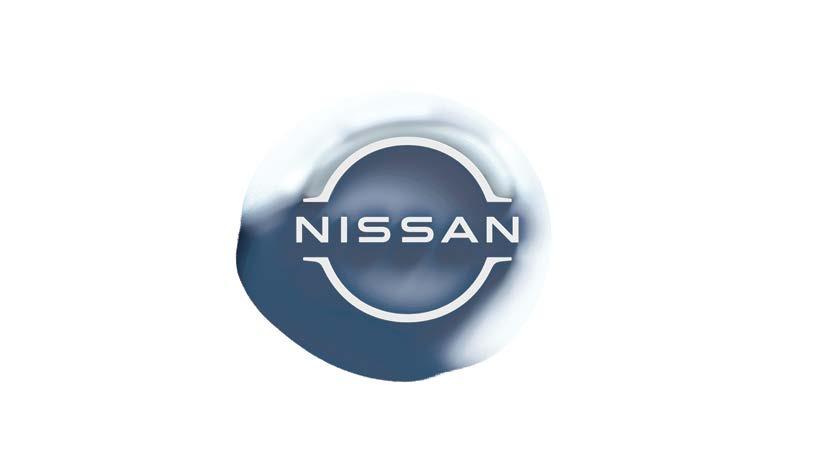



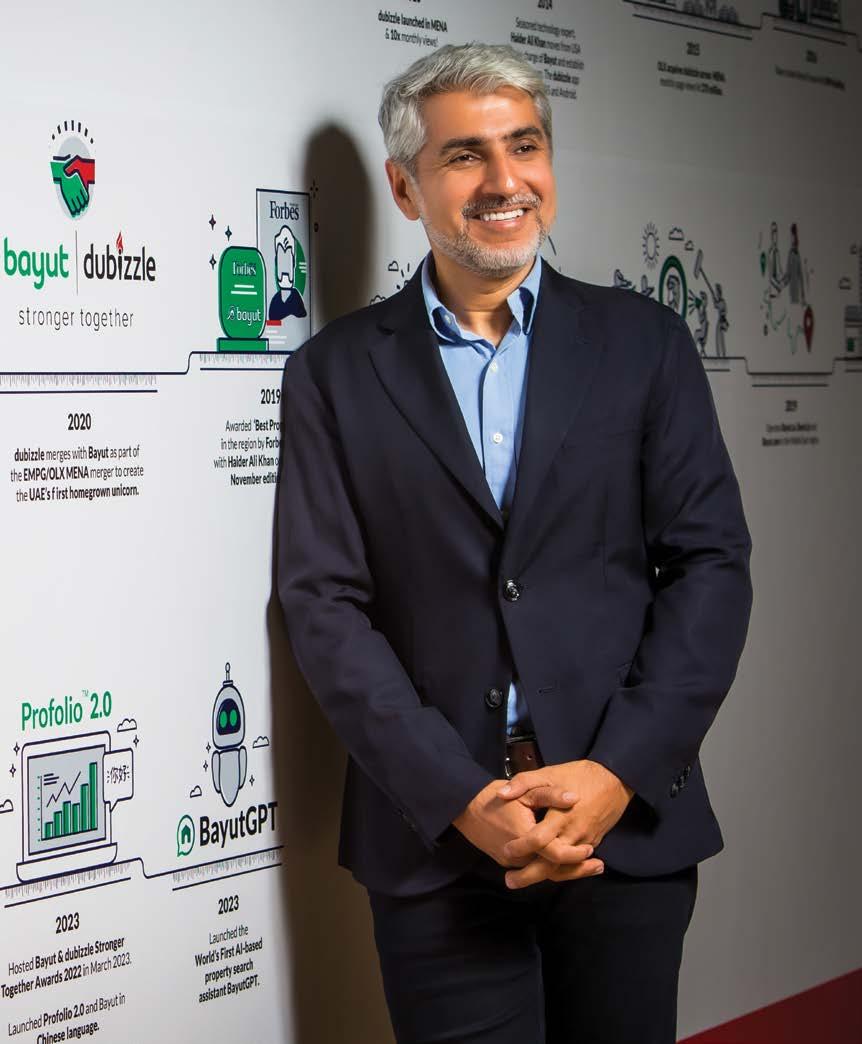



















Step into a world of opulence when you book a Suite at Raffles Doha.
Experience the added luxury of QAR 750 credit to spend on dining in the hotel, and QAR 500 towards any Spa treatment.
Children aged 12 and below are welcome to indulge in the enchantment of complimentary dining.
Rates starting from QAR 3,500 per night
For reservations, please call +974 4030 7100 or email reservations.doha@raffles.com


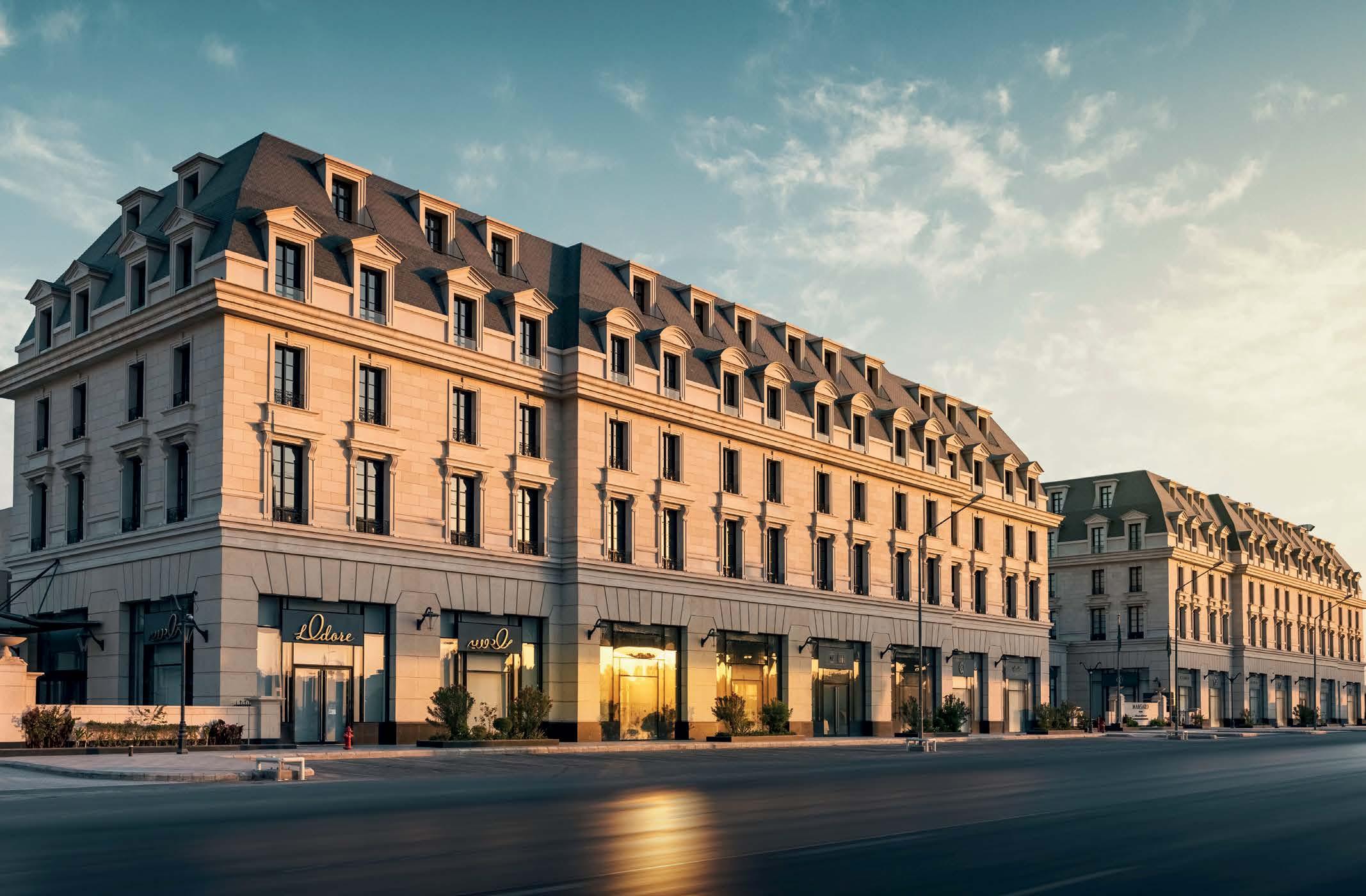



→ Rema Alyahya Vice President, Venture Capital, Merak Capital
/November 1, 2025
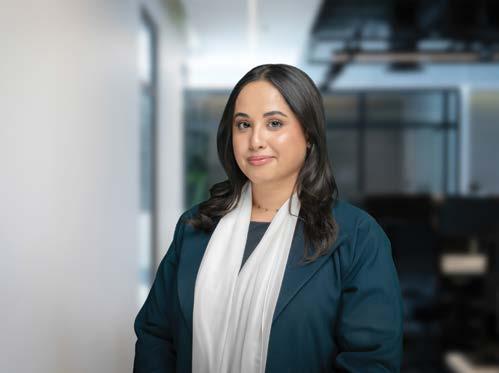
P.15
Mirrored Ambitions
ROHAN MEHTA becomes PETROCHEM’S Managing Director as the company celebrates its 30th anniversary
P.28
Steering the Future of Mobility
In conversation with HUSSAM BAGHDADI , Chief Operating Officer of AW ROSTAMANI AUTOMOTIVE
P.32
Building A Business Of Relationships
As BABYSHOP celebrates its 50th anniversary, CEO RUBAN SHANMUGARAJAH shares his vision for the future
chasing funding, and start chasing sales
P.42
ANAX Developments, ELLE Residences
ANAX Developments latest landmark project has unveiled ELLE Residence redefining branded living in the region.
P.49
Investor Insights
The MENA region’s leading venture capitalists share practical advice to help founders navigate the challenges of building and scaling a startup.
P.54
Building Meaning Beyond Business
How startups Fleetroot and Aumet align with Qatar National Vision 2030
P.37
Finding Direction
SAIRA SHEIKH on why her first brand decision was to choose authenticity over comfort
P.37
Sell More, Pitch Less LACHLAN JACKSON says it is time to stop
P.58
Sweet Deal
FIX Dessert Chocolatier partners exclusively with CAREEM
CEO Wissam Younane wissam@bncpublishing.net
MANAGING DIRECTOR Rabih Najm rabih@bncpublishing.net
ART DIRECTOR Simona El Khoury
EDITOR IN CHIEF Anil Bhoyrul anil@bncpublishing.net
MANAGING EDITOR Tamara Pupic tamara@bncpublishing.net
FEATURES EDITOR Aalia Mehreen Ahmed aalia@bncpublishing.net
DIRECTOR OF INNOVATION
Sarah Saddouk sarah@bncpublishing.net
GROUP SALES DIRECTOR – B2B GROUP Joaquim D’Costa jo@bncpublishing.net
HEAD OF PARTNERSHIPS Samir Glor Samir@bncpublishing.net
COMMERCIAL LEAD Anna Chipala anna@bncpublishing.net
COLUMNIST Tamara Clarke
CONTRIBUTING WRITERS Lachlan Jackson, Saira Sheikh, and Fida Chaaban
SUBSCRIBE
Contact subscriptions@bncpublishing.net to receive Entrepreneur Middle East every issue
COMMERCIAL ENQUIRIES sales@bncpublishing.net
ENTREPRENEUR.COM
Access fresh content daily on our website
EntMagazineME Entrepreneur-me
PO
502511 DUBAI, UAE P +971 4 4200 506
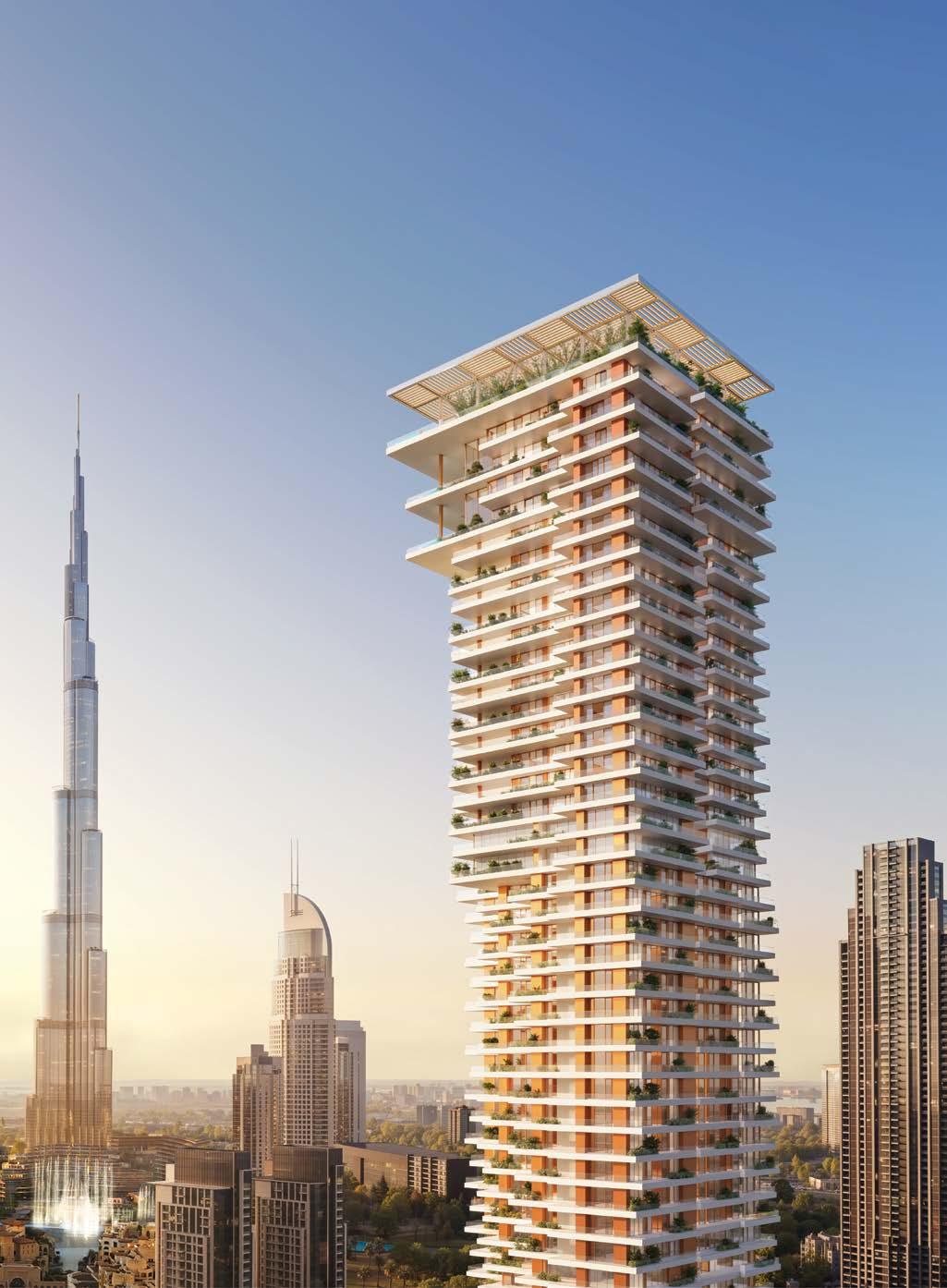




With 8.4 % growth and major infrastructure unlocking new value, Sharjah is changing the map for global capital.

I’ve been following the arc of Sharjah’s development for years, but what I witnessed this week left me genuinely excited. The emirate’s economy expanded by a striking 8.4 % in 2024, nearly triple the global average of around 3 %. That alone is enough to make investors sit up—and here’s why I believe we’re witnessing the emergence of one of the world’s best investment hotspots.
First, the growth is broad-based and durable. More than just a headline number, the surge is being driven by real estate and transport. Real
estate anchors the investment activity, while transport and logistics are recording double-digit increases. What that means for me is a landscape of solid, structural opportunity—not just a spike that’s about to fade.
Second, the location and infrastructure strategy are aligning perfectly. Sharjah is gearing up for what the authorities term a “connectivity leap” — the launch of the Etihad Rail together with expanded airport and port capabilities means Sharjah is positioning itself as a logistics hub for regional and global trade. As an investor, infrastructure that reduces friction is gold.
Third, the environment feels open. The leadership has made it clear: they’re building not just for growth, but for sustainability, quality of life, and a balanced economy. That kind of vision translates into stability—a major plus in my book when deciding where to allocate capital.
So what does this mean, personally, for me—and for you if you’re thinking like I am? It means I’m actively looking at Sharjah’s upcoming property developments, logisticsland parcels, and even tourism-adjacent ventures. The “so what” is clear: getting in at this stage in Sharjah feels like buying into Dubai in the early years—when the premise was right and the upside still large.
In short: Sharjah isn’t just growing—it’s evolving. If you’re scanning the globe for where to invest next, the emirate deserves serious attention. I’m bullish.
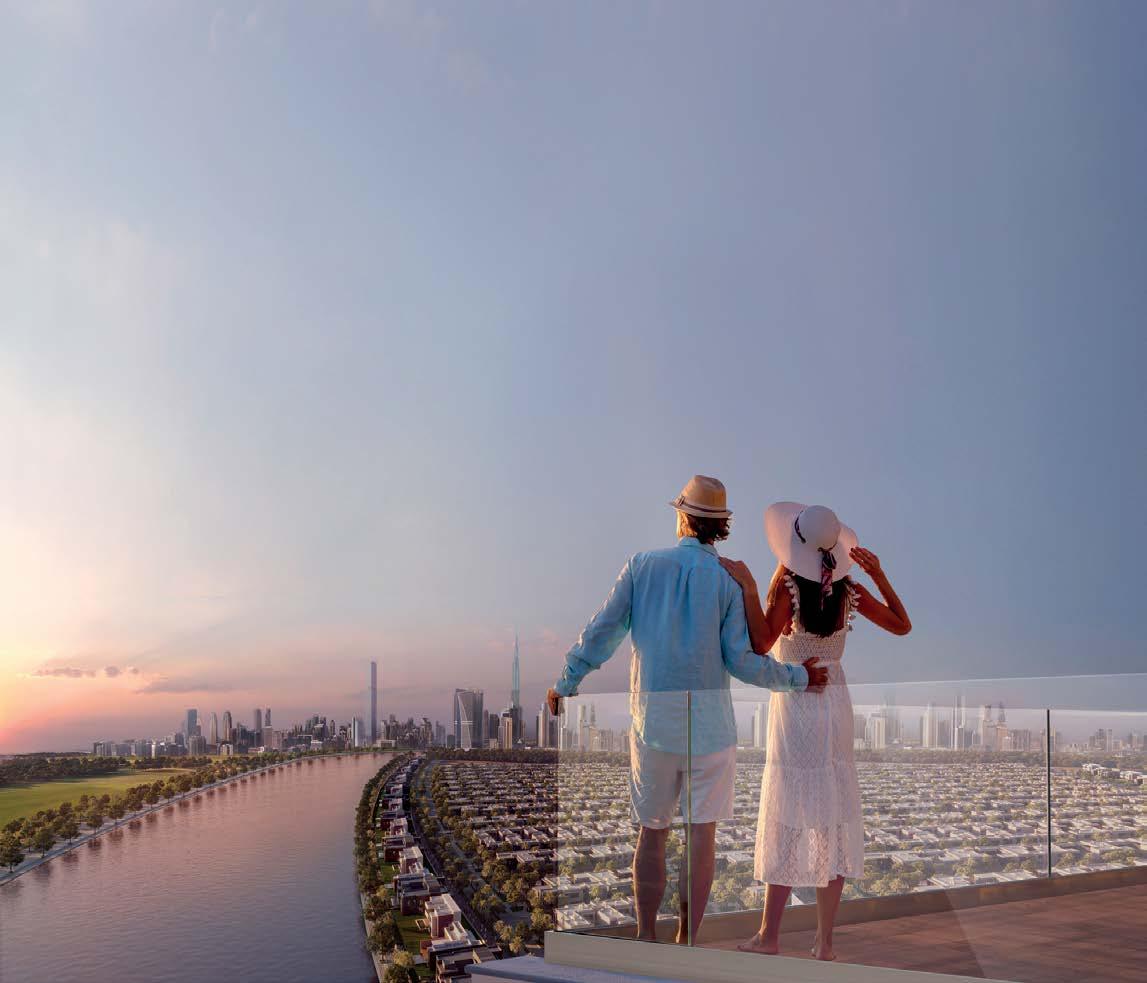
Anil Bhoyrul Editor-in-Chief


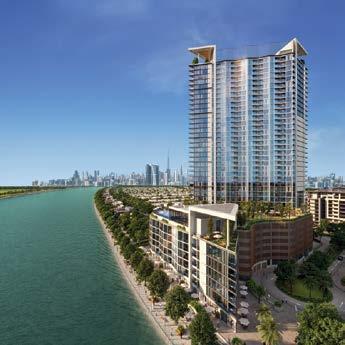


Enlighten Your Eternal Beauty, Inside and Out!
@muarjewels www.muarjewels.com
info@muarjewels.com
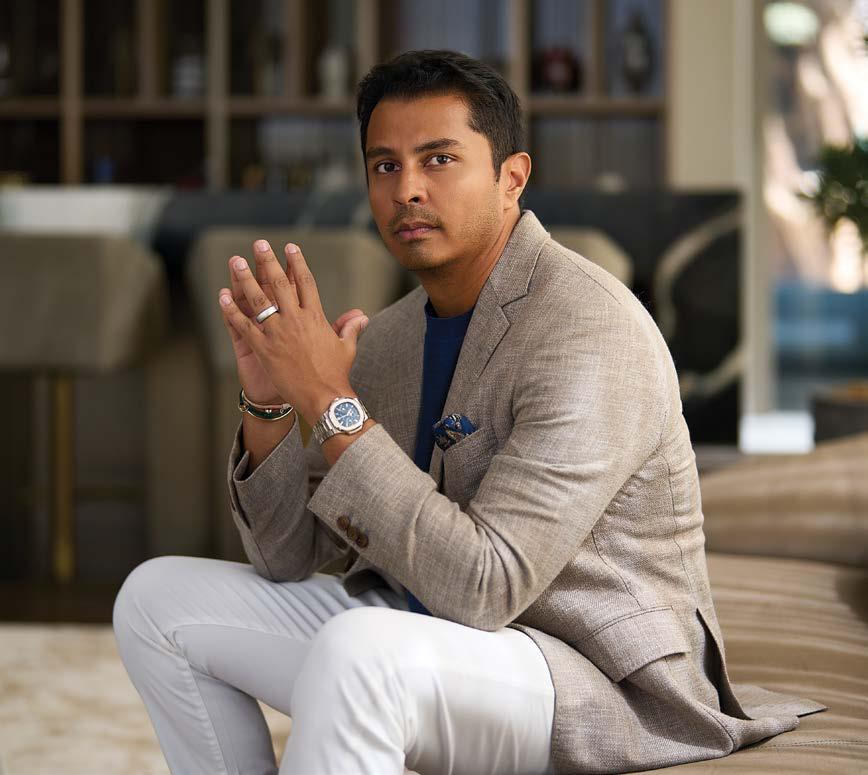
On the company’s 30th anniversary, Rohan Mehta took on the mantle of Managing Director at the UAE-homegrown Petrochem. He talks about what it means to lead a company whose journey has been reflective of the nation’s own growth tale, why effective succession planning is paramount to a family business, and the lessons he’s learned from the brand’s founder- his father, Yogesh “Yogi” Mehta. by AALIA MEHREEN

In the world of business, there are perhaps few situations as daunting as taking on the helm of a 30-year-old company that generates nearly US$2 billion in annual revenue and exports to over 40 countries. Yet that is exactly what Rohan Mehta did, in June 2025, when he became Managing Director of Petrochem Middle East– a petrochemical products’ distribution and trading company that his father, Yogesh “Yogi” Mehta, launched in Dubai’s Jebel Ali Free Zone in 1995. “The biggest lesson I’ve learnt from my father is patience,” Mehta says. “I’ve always been energised by new ideas and opportunities, which can make me quite driven and eager to act, but he taught me that patience ultimately wins the race. It’s about taking the time to make considered decisions rather than rushing, which has been invaluable in building a sustainable business. Another key lesson from him is the importance of trusting and investing in people. He believed that when you hand someone the baton, you must also trust them to run with it. That trust fosters ownership and accountability, which you cannot create alone. This philosophy has shaped how I lead today; our company supports thousands of families, and putting the company first while believing in and empowering our people ensures they, in turn, take the company forward.”
“
It is that trust that Mehta hopes to respect as he now leads a company which has roughly 250 employees and serves global markets from its regional hubs in the UAE, Saudi Arabia, Egypt, and India. “Petrochem currently generates just under $2 billion in revenue across three core verticals: Distribution, Trading, as well as Logistics and Infrastructure, with distribution being the largest (70%) contributor to the business,” shares Mehta. “Beyond the regional hubs, Petrochem also maintains commercial offices around the world, including in the Netherlands, Singapore, Taiwan, China, and Colombia, enabling it to manage operations and reach clients on
INSPIRED BY THE UAE’S OPENNESS TO DIVERSE CULTURES AND NATIONALITIES, PETROCHEM HAS NURTURED AN ENVIRONMENT WHERE DIFFERENT PERSPECTIVES ARE WELCOMED, OUR TEAMS ARE SUPPORTED, AND SUCCESS IS SEEN AS A SHARED JOURNEY: IF OUR PEOPLE WIN, WE WIN.”

a truly international scale. Visibility is key to both sides of the spectrum, our suppliers and customers, which is what truly underpins our global reach and sets us apart.”
But in cementing such a wide reaching presence today, Mehta credits the UAE for having been the perfect launchpad 30 years ago. “Petrochem’s story is inseparable from the UAE’s own growth trajectory,” Mehta says. “Our success is fully correlated with the country’s vision and leadership. We’ve grown alongside the emirate [of Dubai], the nation, and the wider region, and we give full credit to the UAE for creating an environment where homegrown family businesses like ours can thrive. When we began, the UAE was primarily an import hub; today, with its world-class infrastructure and strategic vision, it has evolved into a major export hub, and Petrochem has mirrored that journey. Operating in the UAE has offered immense advantages. The government has provided the right tools and infrastructure to trade, handle operations, and manage the import, export and distribution of petrochemical raw
materials to manufacturing industries globally from the Emirates. Port authorities have also been exceptionally flexible and accessible, enabling smooth vessel movements even when shipments aren’t precisely scheduled, a level of support that is critical in our industry.”
Here, Mehta notes how the government’s proactive strategies have offered unique opportunities to the business. “The UAE’s streamlining of business regulations during challenging times, like the pandemic, acted as a springboard for our recent successes,” he says. “For example, our close collaboration with entities such as the Ministry of Health, particularly during sensitive periods like the surge in demand for sanitiser raw materials, is another testament to how the country’s leadership actively supports the private sector. This partnership-driven ecosystem continues to shape both Petrochem’s growth and the UAE’s position as a global trading hub.”
Beyond the government’s direct initiatives, however, Mehta also credits the UAE’s overall transition from being an
→ With a presence in over 10 countries and a network that supports industries from pharmaceuticals to oilfield services, Petrochem is a leader in distribution, logistics, and supply chain innovation.
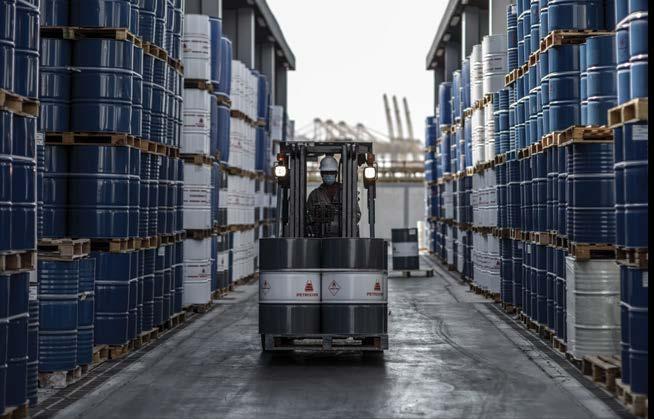
WASN’T AN AFTERTHOUGHT; IT WAS ROOTED IN MY FATHER’S VISION FROM THE VERY BEGINNING. HE HAS ALWAYS BEEN A FORWARD-THINKING LEADER, DETERMINED TO LEAVE BEHIND NOT JUST A THRIVING BUSINESS BUT A LEGACY BUILT TO ENDURE.”
import-export hub to championing local manufacturing as a pivotal shift in Petrochem’s journey. “This created an opportunity for us to cater to demand directly within the UAE, rather than focusing solely on peripheral markets like India and Saudi Arabia, which historically dominated due to their larger populations and manufacturing bases,” Mehta explains. “We give a great deal of credit to this broader manufacturing shift in the country, which has directly supported Petrochem’s long-term hub-and-spoke vision. Our goal has always been to bring petrochemical raw materials closer to our
customers, positioning ourselves at the center of activity rather than on the sidelines. The UAE’s geographic advantage also plays a crucial role in shaping the industry’s landscape. Being strategically located at the crossroads of East and West, the country offers unparalleled access to import raw materials at competitive prices, supported by world-class infrastructure and logistics. This unique positioning has not only benefited the overall industry but also enabled Petrochem to stay aligned with our vision of being a true hub for chemical distribution.”
Now, although Mehta stepped into the role of Managing Director only a few months ago, he has witnessed the impact of such macrotrends and ecosystem changes firsthand. He has, after all, made his way up the ranks at Petrochem having started out as a Sales Manager in 2013. While such extensive experience will clearly hold him in good stead for his new role anyway, Mehta credits an effective management handover strategy for his readiness and confident outlook. “Succession planning at Petrochem wasn’t an afterthought; it was rooted in my father’s vision from the very beginning,” he
shares. “He has always been a forward-thinking leader, determined to leave behind not just a thriving business but a legacy built to endure. That mindset shaped how the company approached every major decision, including leadership transition. When I joined the business 12 years ago as the next generation, it became even more of a priority for me to formalise my vision. We focused on putting robust systems, processes, and foundations in place so the company would not only succeed today and tomorrow, but continue thriving decades from now. Our goal has always been to create a business that can sustain itself for 100 years, not just 10 or 20. This is why succession planning became a strategic initiative rather than a reactive measure. It’s not only about profitability but about building a resilient, sustainable business that stands the test of time.”
Already, Mehta has goals such as vertical integration, digitalisation, and geographic expansion across the Middle East, Africa, and Asia marked out on his vision roadmap. Among these goals is a plan to “inaugurate the largest investment in our history”–a $100 million terminal in Jebel Ali, designed to triple Petrochem’s storage capacity and meet the future needs of global logistics. But underscoring such lofty dreams is the vision the company was created with all those many
years ago. “My father’s original vision was to build a business rooted in strong values and relationships, creating opportunities not just for the company but for everyone connected to it– I’ve sought to honour that by maintaining those values while adding my own leadership style, blending patience with a willingness to explore new ideas, and building on our foundation with a forward-looking approach,” Mehta says. “Beyond my father, my greatest role model has been the people who work with us every day. Their dedication, resilience and commitment to the company inspire me constantly, and they remind me why my father’s lessons about trust and patience remain timeless.”
Much of Mehta's, and indeed his father’s, people-centric approach towards business has seeped into Petrochem’s day-to-day operations and ultimately become the company culture. Here, too, Mehta attributes such workplace attitudes back to the UAE’s own value system as a nation.
“Inspired by the UAE’s openness to diverse cultures and nationalities, Petrochem has nurtured an environment where different perspectives are welcomed, our teams are supported, and success is seen as a shared
“
When we began, the UAE was primarily an import hub; today, with its world-class infrastructure and strategic vision, it has evolved into a major export hub, and Petrochem has mirrored that journey.”
journey: if our people win, we win,” he says. “This commitment is reflected in the loyalty and growth of our senior team members, many of whom have stayed and advanced with the business for decades, a testament to the company’s
long-standing focus on its people. These values are not just part of our heritage; they actively shape our future. They empower us to remain resilient, attract and retain top talent, and seize new opportunities while continuing to grow alongside the UAE.”
Emboldened by his past experience and a clear cut vision for the future, Mehta now hopes to maintain, and grow, the business’ success. “We’re in a legacy business; my job is to keep the ship moving, keep it profitable, and keep oil in the engine so the legacy remains strong,” Mehta declares.
“That’s what brings me to work every day. In the long term, my hope is to build a truly sustainable business that can thrive in a fast-changing world. We’re no longer the generation that founded and built Petrochem from scratch; we’re the team entrusted with carrying it forward. That means creating a culture and a team that deeply believes in the company’s vision, while optimizing and building on the incredible foundation we’ve been given. I feel very fortunate to have a headstart where the seeds have already been planted. My responsibility now is to water and grow them, to turn our existing strengths into new opportunities, and to ensure Petrochem’s name and legacy continue to flourish for decades to come.”



BORN FROM A MISSION TO REDEFINE REAL ESTATE THROUGH TECHNOLOGY, BAYUT SPARKED A MOVEMENT THAT EVOLVED INTO THE GLOBAL PROPTECH AND CLASSIFIEDS LEADER, DUBIZZLE GROUP — AND TODAY, WE GO BACK TO UNDERSTANDING THE HOMEGROWN POWERHOUSE THAT STARTED IT ALL.
by TAMARA PUPIC
When Dubizzle Group — which was established in the UAE and grew under the guidance of Haider Ali Khan — merged with the Amsterdam-headquartered classified businesses OLX Group in 2020, it became the region’s first homegrown unicorn in the digital classifieds and proptech space.
Today, Dubizzle Group is a powerful digital ecosystem that connects individual and business sellers with prospective buyers across multiple verticals, from real estate and automotive. With over 18 million monthly active users, a workforce of 2,600 employees across 10 countries, and impressive profit margins of nearly 50%, Dubizzle Group has become a symbol of sustainable tech success in MENA.
Yet, amid all this scale and success, it’s easy to overlook the true spark that ignited it all — Bayut, the homegrown Dubai startup that grew from a small office in Dubai Internet
City into one of the region’s most inspiring digital success stories.
"Bayut isn’t just a platform; it’s the story of a dream born in the UAE,” says Haider Ali Khan, CEO at dubizzle and Bayut, and CEO of Dubizzle Group MENA. "What began as a simple idea has grown into a movement that’s redefining how people find and experience homes across the nation. Built on technology, powered by data, and shaped by an intimate understanding of the UAE’s heartbeat, Bayut has helped people discover not just properties, but places where their ambitions, memories, and futures take shape."
He adds, "At its core lies a promise of trust, transparency, and innovation. A promise that has turned the complex journey of real estate into something more human, more connected, and more inspiring. Through every listing and every interaction, I feel Bayut continues to build bridges of confidence and craft a smarter, more connected property landscape for the generations to come."
With a degree in electrical engineering from the University of Texas at Austin, Khan spent over 14 years in the United States working with leading technology and finance firms, including Goldman Sachs, Silicon Labs, and National Instruments. Although Bayut was founded in the UAE in 2008, it was in 2014 that Khan moved to Dubai with an aim to "build technology that genuinely makes people’s lives better.” Khan adds, "From day one, Bayut wasn’t

“
BAYUT IS THE STORY OF A HOMEGROWN PLATFORM THAT USED DATA, TECHNOLOGY, AND PASSION TO REDEFINE HOW THE UAE EXPERIENCES REAL ESTATE.”


“EMPOWER THE BEST MINDS, GIVE THEM THE RIGHT DATA, AND LET THEM INNOVATE FEARLESSLY. THAT COMBINATION HAS SHAPED BAYUT INTO A BEST-IN-CLASS PROPTECH
AND A BENCHMARK FOR THE INDUSTRY AND THE REGION.”
just another property portal. We saw an opportunity to solve real problems in transparency, efficiency, and trust using data and technology. My approach to leadership has always been digital-first and humancentric. Empower the best minds, give them the right data, and let them innovate fearlessly. That combination has shaped Bayut into a best-in-class proptech platform and a benchmark for the industry and the region.”
Walking the talk of his philosophy, Khan turned words into action as Bayut brought more than 80 data scientists on board - one of the largest data science teams in the region - to deepen its analytics capabilities, transforming the company into a truly data-rich, insight-led business. "Today, data science powers almost everything we do, from lead scoring and market trend forecasting to hyper-personalized consumer experiences,” Khan explains. "It’s the backbone of how we serve our users and partners better every single day.”
Proof of Bayut’s innovation can already be seen in the success of TruBrokerTM and TruEstimateTM — two proprietary tools that have redefined how the region’s real estate market uses data. But Khan asserts that “it's only the beginning. We have many such exciting, value-driven products in our pipeline.”
In a nutshell, TruBrokerTM is an agent ranking system that rewards quality and accountability, while TruEstimateTM is an AI-powered valuation engine
trained specifically on UAE transaction. Yet, Khan points out. "TruBrokerTM is more than a rewards and recognition system, it's a complete ecosystem designed to elevate agent professionalism and performance through data, gamification, and recognition,” he says. "It brings transparency and accountability into how agents operate, while celebrating the ones who go above and beyond. It’s been amazing to see how TruBroker™ has inspired a whole generation of real estate professionals to embrace digital tools and continuous improvement.”
He adds that TruEstimateTM, on its part, has completely transformed how people think about property valuations. "It’s a data-driven solution powered by our AI models, giving users and agents access to reliable, real-time insights on property prices,” Khan explains. "What’s powerful is how it bridges information gaps and builds trust between sellers, buyers, and brokers by making valuation data accessible, transparent, and credible.”
One of the most revealing ways to understand Bayut’s data-led tools is through the challenges the company set out to solve. That is why TruBrokerTM and TruEstimateTM helped Bayut overcome its biggest early challenge - ensuring accuracy and trust in property listings. "We knew that if we wanted to raise industry standards, we had to build technology that enforced accountability while rewarding integrity,” Khan says. " That’s where TruCheck™ and TruBroker™ made a real difference.
"Before TruCheck™, the market had verification tags, but they were largely surface-level, inconsistent, and often outdated. Users were still left wondering whether a property was genuinely available or not. TruCheck™ changed that paradigm. It went beyond simple labels by validating listings directly against real-time availability, using data authentication rather than declarations. That was a first for the region. It gave people the confidence that what they saw on Bayut was real, accurate, and up to date, setting a completely new standard for trust and transparency in the UAE’s real estate industry.
"TruBroker™, meanwhile, helped us address the behavioural side of the challenge by rewarding agents who consistently deliver accurate, high-quality listings and exceptional service.
By combining innovation with data and recognition, we didn’t just fix a market issue, we shifted the culture. Today, accuracy, responsiveness, and professionalism are measurable and celebrated. That’s how technology drives real, sustainable change."
For Bayut, however, growth and innovation must go hand in hand with one non-negotiable principle — trust. As Khan notes, “growth without trust is short-lived.” He adds, "Every innovation we launch has to strengthen confidence whether it’s for the end
“WE DON’T ACQUIRE FOR THE SAKE OF SIZE; WE ACQUIRE TO ENHANCE VALUE. IF THERE’S AN OPPORTUNITY THAT ACCELERATES OUR DIGITAL VISION OR STRENGTHENS THE USER JOURNEY, WE’LL ABSOLUTELY EXPLORE IT.”
user, for the agent, or for the ecosystem as a whole. Our north star has always been trust through technology. That’s how we’ve managed to grow rapidly while remaining the most trusted name in UAE real estate.”
Taking it a step further, Khan reiterates that Bayut’s future isn’t defined by innovation alone, but by the impact those innovations create. "We track data points, yes. Engagement, ROI, conversion; these are all important but the real metric is how much easier and more informed we make the property experience and how much more value we have created for our partners,” he says. "The fact that we attract the largest traffic and have the highest number of agency
partners working with us today is a sign that we are on the right path.”
With an aim to scale their impact, Bayut and its parent company, Dubizzle Group, have made a series of strategic acquisitions over the years — including Lamudi in April 2019, DriveArabia in May 2024, and Property Monitor in April 2025. "Our acquisitions are always about synergy and scalability,” Khan explains. "Property Monitor strengthened our analytics and valuation capabilities, while DriveArabia deepened our automotive ecosystem. We don’t acquire for the sake of size; we acquire to enhance value. If there’s an opportunity that accelerates our digital vision or strengthens the user journey, we’ll absolutely explore it."
Bayut’s Haider Ali Khan Advises Proptech Entrepreneurs
}"Start with purpose, stay obsessed with the customer, and build on data. Proptech isn’t just about code, it’s about context. The UAE is a
Khan highlights that operating in the UAE - where the government leads with vision and innovation - has been a defining advantage for Bayut. "Our partnerships with Dubai Land Department and Abu Dhabi Real Estate Centre are testaments to that,” he says. Together, we’ve worked on digital integrations that make real estate transactions more transparent and compliant. We share the same goal - to make the UAE the most advanced, tech-enabled real estate market in the world.
He adds, "Dubai is built for scale and ambition. The infrastructure, policy environment, and openness to innovation are unmatched. The city rewards companies that think big but execute with precision and that’s where Bayut thrives. The leadership here doesn’t just encourage innovation, it institutionalizes it. That’s incredibly powerful for a proptech company with a vision like ours."
As the region’s property market becomes increasingly digital, the proptech landscape is shifting toward smarter, data-led decisionmaking. Khan believes the next few years will mark the beginning of an “age of intelligent real estate,” where
phenomenal launchpad, but to succeed you need to blend speed with substance. Focus on solving problems, not following trends. If your tech can make life easier for even one person today, you’ll find your scale tomorrow."
every choice — from pricing to investment — will be informed by real-time data and predictive insight. "The next three to five years will see AI valuations become the norm, blockchain simplifying transactions, and predictive insights transforming how people buy and sell homes.” However, Khan points out that "as surprising and contradictory as this might sound, technology will be making real estate more human centric again.” He explains, “Technology is removing friction, uncertainty, and bias from the process. Whether it’s through personalized recommendations, immersive tours, or smart valuations, we’re giving people confidence and control in one of the biggest decisions of their lives. That’s the real power of digital innovation.”
Against this backdrop, Khan foresees Bayut reaching new heights. "We’ll continue to lead with innovation. More AI-driven tools, immersive 3D and AR experiences, and deeper integration between data, AI and decision-making. We’re not just building for the UAE, we’re building a proptech model that the world can learn from,” Khan concludes.
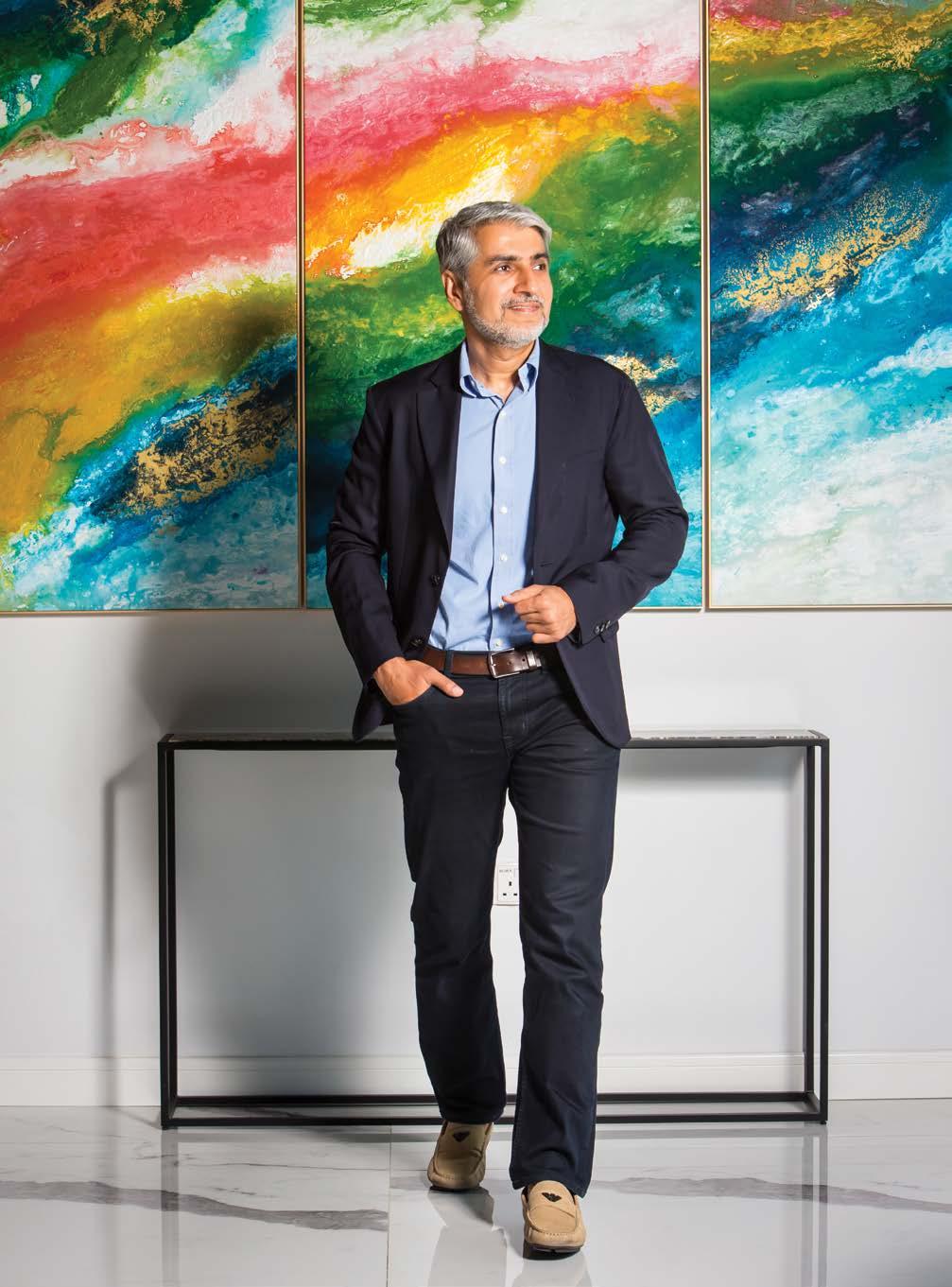
/The Big Idea
Under Hussam Baghdadi’s leadership, AW Rostamani Automotive is evolving beyond vehicles toward a connected mobility ecosystem. The COO shares with how purpose, integrity, and innovation are shaping both his leadership legacy and the wider transformation of the UAE’s automotive landscape.
by WISSAM YOUNANE
In this exclusive Q&A, Hussam Baghdadi, Chief Operating Officer of AW Rostamani Group, reflects on the legacy he seeks to build—one rooted in resilience, integrity, and innovation—as he aligns the company’s automotive operations with the UAE’s vision for a sustainable, technology-driven mobility future.
You’ve been with AW Rostamani Automotive for more than three decades, rising from a sales consultant to Chief Operating Officer (COO).How has this journey shaped your leadership philosophy?
When I joined AW Rostamani Automotive in 1995, I had an enthusiasm for cars, but little experience in the industry. What I did have was curiosity, and that made all the difference. From my early days as a sales consultant to now leading the organization, I’ve worked through nearly every stage of the customer and operational journey. That exposure grounded me in the realities of what makes our business thrive: people, trust, and service.
My leadership philosophy was shaped by that foundation. I’ve learned that titles don’t define leadership - responsibility does. The higher you rise, the greater your duty to
create clarity, inspire growth, and empower others to lead. Success in our industry is never a solo effort; it’s the collective strength of people who believe in a shared vision. That belief continues to guide how I lead today, with integrity, inclusivity, and a deep respect for the people who drive our progress.
Having overseen the transformation of multiple global brands under AWR, what do you see as the key leadership traits that have enabled you to guide teams through disruption and change?
In times of change, people don’t follow plans; they follow conviction. When disruption hits, teams look for steadiness, clarity, and empathy in equal measure. I’ve found that the most effective leaders are those who can be firm in direction yet flexible in approach.

“I’VE LEARNED THAT TITLES DON’T DEFINE LEADERSHIP - RESPONSIBILITY DOES. THE HIGHER YOU RISE, THE GREATER YOUR DUTY TO CREATE CLARITY, INSPIRE GROWTH, AND EMPOWER OTHERS TO LEAD.”
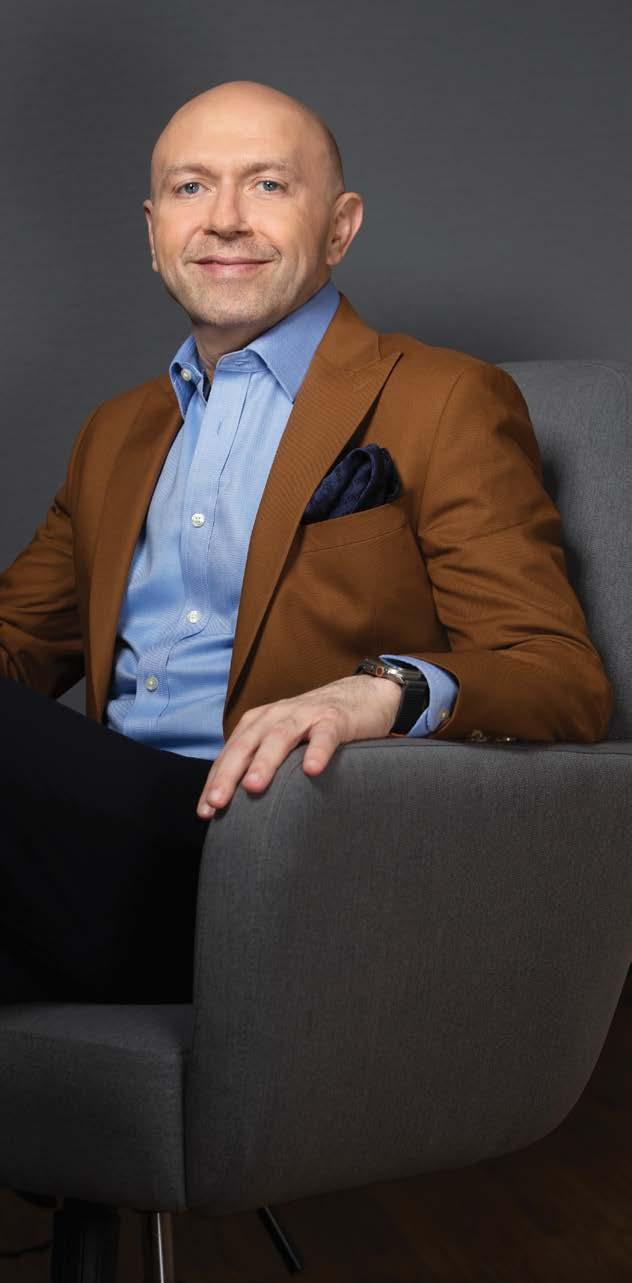
At AW Rostamani Automotive, we’ve navigated transformations: digital, economic, and structural, by focusing on transparent communication and a clear sense of purpose. My approach has always been to connect strategy with humanity: to make sure people understand why change is happening and how they are part of the journey. That combination of decisiveness and empathy builds resilience, and resilience is what ultimately sustains performance through uncertainty.
The automotive industry is undergoing rapid digital disruption. How is AW Rostamani Automotive harnessing AI-powered tools—such as predictive inventory management and smart stock planning—to transform dealership operations?
AI has moved from being a futuristic idea to an operational backbone. In a business where timing, precision, and availability shape customer satisfaction, predictive intelligence is transforming the way we plan and respond.
We see it as a strategic enabler that drives speed, accuracy, and smarter decision-making. Our new Parts Distribution Center in Dubai Industrial City - the largest of its kind in the UAE - will bring predictive systems together under one roof, setting new standards for efficiency and responsiveness. Beyond automation, AI empowers our teams to focus on innovation and customer relationships while technology manages complexity. It’s how we’re building a smarter, more agile dealership model designed for the future of mobility.
In your view, how will AI-driven, data-powered decision-making redefine sales, after-sales, and marketing strategies across the UAE in the coming years?
AI is redefining what we mean by “knowing the customer.” Data now allows us to understand preferences, predict needs, and personalize engagement across every touchpoint, from the first click to post-purchase service.
In sales, that means identifying how and when customers prefer to connect. In after-sales, it means anticipating service
B→ AW Rostamani Group is a leading multi-sector family business in the Middle East, driven by a legacy of over seven decades.

THE PERSONAL FIRSTS ARE THE ONES THAT HAVE HAPPENED WHEN I WAS VERY YOUNG. I WAS THE FIRST ONE TO WIN NATIONALS WHEN I WAS 12, AT THE UNDER-14 AND THEN THE UNDER-16 CATEGORIES. SO STUFF LIKE THAT, WHICH IS NOT REALLY OUT THERE IN THE WORLD, ARE JUST AS SPECIAL.”
requirements before an issue arises. In marketing, it means focusing resources on what truly matters, not just what’s visible.
But data alone doesn’t create value - interpretation does. That’s why we are using AI to build connected intelligence across functions, not silos. When sales, service, and marketing insights work in harmony, the result is an ecosystem that serves customers seamlessly and builds loyalty organically.
With mobility increasingly seen as a service rather than a product, how do you envision advanced technologies and AI reshaping the way customers interact with cars in the region?
Mobility today is about access. Customers want freedom to choose, to switch, to personalize how they move. AI is enabling that flexibility by bridging digital discovery with physical experience.
Our goal is to expand choice. Some customers value the pride of owning a Patrol or QX80; others prefer short-term leasing or subscription models for city driving. Technology allows us to serve both, intelligently and intuitively.
AI deepens this by analyzing behavior and suggesting tailored solutions that make every interaction feel personal. The future of mobility will be about designing journeys that evolve with people’s lives.
Today’s customers expect seamless, frictionless journeys. How is AWR reimagining the online-to-offline car buying experience?
Today’s customer is better informed than ever. By the time they walk into a showroom, they’ve already done the research, compared models, and read reviews. Our role is to elevate the experience.
We’ve reengineered our processes to make the digital-to-physical transition effortless. Whether it’s through online configuration tools, digital kiosks, or AI-driven lead tracking, every touchpoint connects seamlessly, but we never lose the human element. Technology makes the process faster; people make it meaningful. That combination is where real customer satisfaction lives.
What role does personalization and digital-first engagement play in strengthening trust and loyalty with customers?
Personalization is the modern form of respect. It tells the customer: we see you, we understand you, and we value your time. Our digital-first approach ensures that every interaction - from a service reminder to a product offer - is relevant and timely. By using data ethically and intelligently, we’re able to build trust over time. The result is loyalty that isn’t transactional, but emotional. Customers stay because they want to.
Beyond the sale, what are some of the post-purchase engagement initiatives you’re championing to build long-term relationships with customers?
The sale is only the beginning of the relationship. What defines a brand is how it shows up after the transaction. We’ve invested in digital platforms that simplify ownership, from booking a service to tracking vehicle updates in real time. Our loyalty programs and community events extend that engagement beyond the workshop, into lifestyle, wellness, and purposedriven initiatives.
After-sales, to me, is a philosophy. It’s about staying present in the customer’s journey long after the handover, ensuring they always feel supported, appreciated, and connected.
Do you see sustainability practices evolving into a competitive differentiator for automotive companies in the Middle East?
Sustainability has evolved from being a moral obligation to a business advantage. Customers are now choosing brands that reflect their values.
In our region, we’re seeing an accelerated transition toward electric mobility, supported by national visions and policy frameworks. We see sustainability as part of innovation. Whether it’s through energy-efficient operations, EV adoption, or community-driven initiatives, our aim is to create impact that’s both measurable and meaningful.
Leadership today is measured by purpose aligned with progress, which becomes a true differentiator.
The UAE has positioned itself as a mobility and smart-city hub. How is AW Rostamani Automotive aligning with and contributing to this national vision?
The UAE’s vision for smart mobility is a masterclass in combining ambition with execution. It’s not just about futuristic ideas - it’s about building the infrastructure and ecosystem that make those ideas accessible to people.
At AW Rostamani Automotive, we’re proud to play a role in that transformation. From advancing EV adoption to integrating digital retail and service platforms, our initiatives are designed to make
innovation tangible. We align our strategy with the national agenda so that every step we take contributes to the UAE’s broader journey toward smarter, more sustainable cities.
From your vantage point, what role can the UAE play in shaping the regional dialogue on the future of mobility and innovation?
The UAE is leading in the mobility transformation.
“THE SALE IS ONLY THE BEGINNING OF THE RELATIONSHIP. WHAT DEFINES A BRAND IS HOW IT SHOWS UP AFTER THE TRANSACTION.”
With responsibility across Nissan, INFINITI, and Renault, how do you approach bridging global OEM strategies with the unique needs of the local market?
Global automotive brands bring technological excellence and strong product portfolios, but success in the UAE depends on cultural intelligence, understanding how people here live, drive, and connect. Our role is to bridge the global and the local. We adapt global strategies from Nissan, INFINITI, and Renault to create experiences that resonate authentically with customers in this market. Whether it’s refining model mixes, tailoring communications, or enhancing aftersales service, we make sure every decision reflects both international quality and local relevance.
The nation’s investments in smart infrastructure, advanced regulation, and innovation ecosystems are setting a regional benchmark. Its ability to pilot new technologies and scale them effectively gives it both influence and credibility. The UAE doesn’t just talk about the future. That blend of vision and execution is what positions the country to shape the regional dialogue on mobility and innovation for years to come.
Looking ahead, what do you see as your most important legacy contribution—both within AW Rostamani Automotive and the wider automotive industry in the region? Legacy, for me, will be measured in people as much as in projects. Within AW Rostamani, I want to be remembered for
building resilient, values-driven teams that carry forward the culture of integrity and customer focus. Beyond the company, I hope my role is seen in how we helped align the automotive industry with the UAE’s wider vision of mobilityone that embraces technology, sustainability, and service as part of a single ecosystem. If I have contributed to preparing both the company and the industry to meet the future with confidence, that will be a legacy worth leaving.

Wissam Younane is a prominent media executive and entrepreneur based in Dubai, United Arab Emirates. He serves as the CEO of BNC Publishing, the company behind Entrepreneur Middle East, a leading business media platform in the MENA region.Under his leadership, BNC Publishing has become a key player in the regional media landscape, producing content that supports and celebrates entrepreneurship and innovation.Younane is known for organizing high-profile events that bring together influential figures from the business world. For instance, he played a central role in hosting the “Legends of Entrepreneurship Awards” in February 2025, which honored notable entrepreneurs and featured former UK Prime Minister Boris Johnson as a keynote speaker.

As children and maternity brand BabyShop celebrates its 50th anniversary, CEO Ruban Shanmugarajah shares how five decades of centering trust and safety is already defining the future roadmap for a new generation of families.
by AALIA MEHREEN AHMED
In the little over fifty years that the regionally homegrown children and maternity retail brand BabyShop has been operational, while parenthood and the emotional and economic complexities that accompany it have evolved, what hasn’t changed is the visceral bond that defines parent-child relationships. So when Ruban Shanmugarajah took on the role of CEO at Babyshop in 2021, he was faced with a related dilemma. “My first thought was, ‘how do we preserve the heart of this brand while preparing it for its next era?’” he shares. “Babyshop has always been built on warmth and trust, and I did not want to lose that. But I was also looking at a generation of parents who are digital-first, globally influenced, and expecting brands to meet them where they are. My vision was to evolve Babyshop without losing its soul. Four years on, a few milestones stand out. Our digital shift has been transformational, not just building e-commerce but creating a truly omni-channel brand where online and offline amplify each other. We have modernised our stores, sharpened our assortments, and made our collections more aspirational without ever losing accessibility. To me, the real win is that families today still recognise the Babyshop they trust, but they see it in a fresher, more relevant form.”
Launched in 1973 in Bahrain under Landmark Group, one of the largest retail and hospitality conglomerates in the Middle East, BabyShop today operates over 250 stores across MENA, Africa, Southeast Asia, and India. “Saudi Arabia

“
We have modernised our stores, sharpened our assortments, and made our collections more aspirational without ever losing accessibility. To me, the real win is that families today still recognise the Babyshop they trust, but they see it in a fresher, more relevant form.”
and the UAE continue to be our biggest markets, but our expansion into Southeast Asia and India is particularly exciting,” Shanmugarajah adds. “Both regions have welcomed Babyshop with real enthusiasm. As for verticals, apparel remains our leading category, powered by our in-house brands and our ability to respond quickly to evolving style trends. Nursery, toys, and travel gear are also growing strongly, driven by conscious parenting, gifting, and the need for practical, high-quality essentials. It is no longer about being just a children’s clothing retailer. Today, Babyshop is positioned as a complete partner in parenting, and that breadth of trust across categories is one of our greatest strengths.”
Indeed, in addition to keeping up with a digitally transformed retail industry and changed consumer tastes, Shanmugarajah notes that there has been the added onus of fully understanding the psyche of the
modern day parent. “Parents today are raising children in a very different world– they are far more informed, intentional, and discerning in their choices,” he notes. “Quality and safety are non-negotiables, but they also want brands that simplify their lives, inspire them, and make everyday parenting easier.
Parenting has become more planned, and expectations from retailers are higher than ever. At the same time, cultural values remain central in this region, and those traditions continue to shape how families make decisions. At Babyshop, these shifts have influenced every part of our operations. We have doubled down on product innovation, from design and fabrics to bringing in best-inclass features in quality and safety.”
In turn, three tenets became paramount to Babyshop’s operations. “Parents told us what mattered: relevant products, better availability, and smoother omni-channel
LOYALTY IS NEVER INSTANT; IT IS BUILT SLOWLY, OVER YEARS, SOMETIMES DECADES. FOR BABYSHOP, IT HAS COME FROM BEING PRESENT IN PEOPLE’S LIVES AT THE MOMENTS THAT MATTER MOST. PARENTS WHO ONCE WALKED INTO OUR STORES IN THE 80S ARE NOW RETURNING WITH THEIR GRANDCHILDREN, AND THAT GENERATIONAL BOND IS SOMETHING I VALUE DEEPLY.”
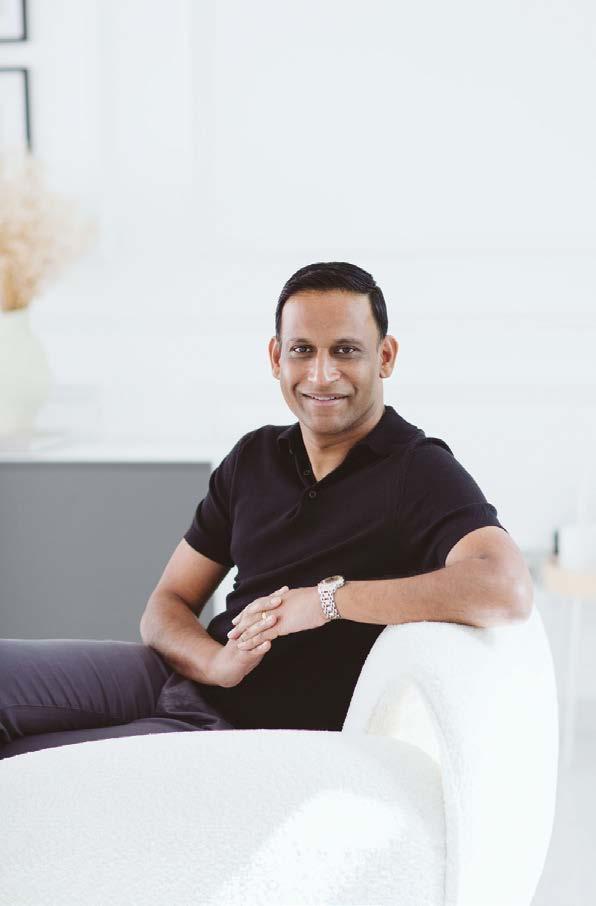
experiences,” Shanmugarajah says. “We listened, and then acted quickly: building sharper assortments, renovating stores, stepping up our marketing, and fine-tuning our supply chain. That agility has been key. The uplift is encouraging, but I do not see it as an end point. For me, it is a signal, proof that when we stay agile and in tune with families, growth follows. It gives us the confidence to double down on our next chapter: deeper omnichannel integration, expansion in emerging markets, and building even more depth across our categories.”
In the midst of such parent-centric shifts, Babyshop has also had to keep an eye on how pop culture interests and emotional intelligence of toddlers and children today are much different than that of previous generations. “Kids today are incredibly expressive– they want their clothes, toys, and even accessories to reflect who they are,” Shanmugarajah explains. “Our role is thus to give them that sense of individuality without fast-tracking them out of childhood. That is where our research and design teams play a critical role. They take global fashion cues, then reinterpret them in ways that are playful, comfortable, and age-appropriate. Partnerships also matter here. We work closely with global names like Disney and Mattel, and more recently with anime and gaming properties, to create collections that excite children while delivering value for parents. It is about listening carefully and giving families what they aspire to buy, but doing so responsibly so the joy and innocence of childhood remain intact.”
As such, it is these strategies that have amalgamated into what “innovation” means to the brand today. “Our approach is to keep an eye on global innovations in these areas and be the first to bring them to market for parents in our region,” Shanmugarajah says. “Alongside that, we have introduced seamless technology in our stores to support customer journeys better, trialled new store layouts and formats to suit different shopping missions, and strengthened our omni-channel capabilities so parents can interact with us however they choose. Even in marketing and content, we are becoming sharper and more efficient to ensure that families see Babyshop as relevant at every touchpoint.The balance between innovation and cultural values lies in listening carefully and adapting thoughtfully. Not every global trend is right for this region, and we are conscious of that. Our role is to bring modernity, convenience, and inspiration in ways that feel authentic here, so parents see Babyshop as both forward-looking and deeply rooted in the values that matter to families. That is what keeps us both relevant and trusted.”
But as much as Shanmugarajah’s leadership model has been forwardlooking, it has also, deeply, been reflective of the values that has allowed Babyshop to thrive for five decades in the region. “Loyalty is never
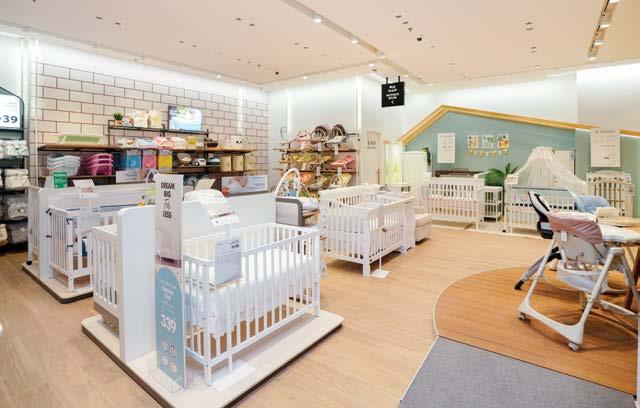
instant; it is built slowly, over years, sometimes decades,” he notes. “For Babyshop, it has come from being present in people’s lives at the moments that matter most. Parents who once walked into our stores in the 80s are now returning with their grandchildren, and that generational bond is something I value deeply. At the heart of it is trust: trust that the product will last, that the pricing is fair, and that the brand understands families. What has not changed in 50 years is our philosophy that we are not in the business of transactions; we are in the business of relationships. That mindset shapes how our teams show up every single day.”
One such unchanged value has been Babyshop’s commitment to never
compromise on quality and sustainability in favor of the fast fashion model. “This is where we have drawn a very firm line,” Shanmugarajah emphasizes. “Parents should never have to choose between affordability and safety. We design with longevity and wellbeing at the centre, from cotton-rich fabrics tested to international standards, to non-toxic finishes in our nursery ranges, to durability built into our travel gear. We back this up with action. For example, our nursery and travel ranges come with a two-year warranty. For a brand trusted by millions of parents over decades, this is more than a promise, it is a responsibility. And it is why quality and safety remain non-negotiable at Babyshop, regardless of price.”
As Shanmugarajah now
gears up for the final stretch of 2025 and the new year, it is this legacy that he hopes to continue honoring in leading a brand that has become deeply embedded in family life across the region. “Families trust us with some of their most important milestones, from the first crib to the first school bag, from birthdays to everyday essentials,” he says. “That level of trust is humbling. It is a privilege, but also a deep responsibility. It also sets the compass for our future. Every decision we make, whether growth, innovation, or partnerships, has to answer one question: are we making families’ lives better? If the answer is ‘yes,’ then it is the right path. That principle has carried us through 50 years, and it will keep Babyshop relevant for the next 50 and beyond.”



Why my first brand decision was to choose authenticity over comfort. by SAIRA SHEIKH

For five years, my book lived only in my journals. Raw, unfiltered, and entirely private. The idea of becoming an author and publishing my work didn’t begin with a marketing plan or a target demographic. It began with a simple, terrifying question: What if my silence is costing someone else their healing?
When I lost my mother, I inherited two competing narratives. My Pakistani heritage taught me that grief should be endured quietly, that discussing emotions signaled weakness, and that “moving on” was an unspoken expectation. But my inner voice, the one drowning in anxiety and depression refused to stay silent. That tension between cultural conditioning and personal truth became the foundation of both my book, Healing in the Shadow of Loss, and my author brand.
Every entrepreneur faces a crucial pivot point. Mine came when I realized that building an author brand meant deciding who I was writing for. The safe choice would have been to write something
palatable, something that didn’t challenge cultural taboos around mental health and therapy. But the market I needed to serve was the one suffering in silence across South Asian communities and beyond. It required radical honesty.
So my first brand decision was this: I would be the author who said what others couldn’t and be honest about it. I identified a gap: readers needed something deeply personal yet practically applicable and relatable. They needed permission to hurt while being shown a path forward. More importantly, they needed someone who understood the cultural weight of staying silent about pain and societal expectations.
I also made a decision to write for two audiences simultaneously: those grieving and those supporting grievers. This doubled my potential market while filling another gap. Most grief books ignore the desperate supporters who want to help but fear saying the wrong thing. By addressing both, I created a book that could be gifted, recommended by therapists, and used in support groups, expanding distribution channels organically.
Location as Business Asset:
One of the most underestimated aspects is the environment. Dubai became my unexpected business partner.
As an expatriate in this multicultural hub, I had access to resources unavailable in more culturally homogeneous settings: diverse perspectives, mental health services without stigma, speaking events featuring global thought leaders, and a community that celebrated rather than silenced personal transformation. This city’s culture of opportunity allowed me to test my message in real-time. I could gauge reactions across cultures and understand which aspects of my story had universal resonance versus which were specifically culturally rooted. Your location shapes your brand. For authors writing about culturally sensitive topics, being in an environment that embraces diverse narratives isn’t just helpful, it’s essential!
Turning Pain into Platform:
Building an author brand in the self-help space means your product is your pain. Your brand is built on the worst moments of your life, carefully packaged for public consumption.
This creates a unique challenge. How do you build a platform on vulnerability without becoming performatively broken?
My answer was “healing with intent”, both as a philosophy in my book and as a business practice. I positioned myself not as someone still drowning in grief, but as someone who had done the work, carrying
it forward and was now extending a hand to others.
Before I ever wrote a word of my book, I discovered another path through grief: creation itself. During my darkest days, I launched a luxury candle venture, her in the UAE – called Glam Accents. It wasn’t a calculated business move, it was survival. Working with my hands, experimenting with scents, building something tangible from raw materials became deeply therapeutic. Creation offered an outlet. The process of transforming simple ingredients into something beautiful mirrored what I was trying to do with my own pain.
This venture taught me invaluable lessons that later shaped my author brand. I learned that healing doesn’t have to look one way. Tt can be journaling, connections,
This experience became foundational to my book’s philosophy. When I write about “healing with intent” and taking active
showed me that we heal by making, by doing, by transforming our pain into something that exists beyond ourselves.
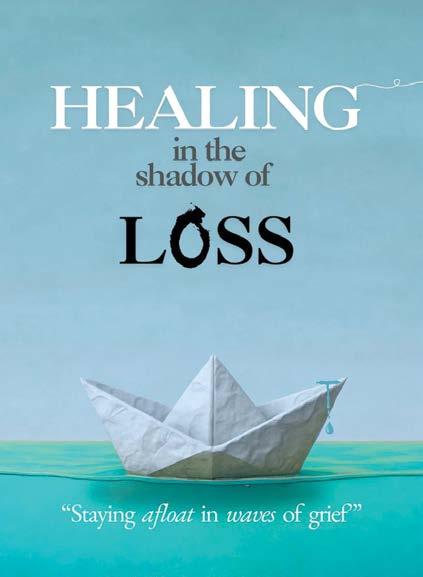
THIS CITY’S CULTURE OF OPPORTUNITY ALLOWED ME TO TEST MY MESSAGE IN REAL-TIME. I COULD GAUGE REACTIONS ACROSS CULTURES AND UNDERSTAND WHICH ASPECTS OF MY STORY HAD UNIVERSAL RESONANCE VERSUS WHICH WERE SPECIFICALLY CULTURALLY ROOTED.
therapy, or melting wax at 2 AM. I discovered that building something entrepreneurial while grieving wasn’t distraction; it was integration. Most importantly, I understood viscerally that creation itself is healing.
steps toward wholeness, I’m not speaking theoretically. I’m speaking from the experience of building something while rebuilding myself. The therapeutic effect of creation, whether crafting candles or crafting sentences,

Saira Sheikh is a multicultural author, entrepreneur, and mental health advocate whose unique global perspective spans over three decades as an expatriate.
Born and raised in Saudi Arabia, Sheikh has called five different countries home, creating adaptability and a rich tapestry of cultural understanding that deeply informs my writing and worldview. She pursued higher education across continents, earning her business degree through studies in both Pakistan and the United Kingdom. Professionally, Sheikh has successfully navigated both the corporate world and academia. For the past 13 years, Sheikh has lived in the UAE, where she balances her role as a devoted mother of two, along with her entrepreneurial venture Glam Accents- a brand of hand poured luxury soy candles.
Sheikh’s debut book, Healing in the Shadow of Loss, marks my emergence as a significant voice in mental health literature making her the first Pakistani author to pen a non-fiction self help book on healing after loss. Published internationally on Amazon, this nonfiction self-help work draws from Sheikh’s journey and cultural insights to address the critical gap in mental health resources for multicultural communities rather than a scientific or clinical perspective. Sheikh’s work primarily centers on creating inclusive spaces where authentic conversations can flourish within the framework of cultural respect and understanding.

Want to start a business? Stop pitching investors and start selling customers. Too many founders fall into the trap of thinking the key to building a successful company lies in a pitch deck. They spend months refining slides, polishing numbers, rehearsing lines for investors. But none of this matters, if nobody wants to buy what you’re selling. All this time spent pitching is time that is not spent selling.
Raising money isn’t real validation. It’s just fuel. The real test is whether anyone actually cares enough to pay you for your product or service. When you’re out there selling, you’re learning. Every conversation is instant feedback on what works, what doesn’t, what people value and what they’ll pay for. It’s faster, cheaper and far more honest than anything you’ll get from an investor meeting. The market doesn’t challenge your hockey-stick shaped financial projections or ask for follow-up slides. It doesn’t waste your time; it just tells you, very clearly, yes or no. When you speak to customers, you’re dealing with human beings who are evaluating your offering from a completely different perspective to an investor, and genuinely hoping it will solve their
STARTUPS THAT VALIDATE EARLY BY SELLING TO CUSTOMERS ARE FAR MORE LIKELY TO SUCCEED THAN THOSE THAT RAISE FIRST. ACCORDING TO CB INSIGHTS, THE MAJOR CAUSES OF STARTUP FAILURE ARE RUNNING OUT OF CASH AND A LACK OF MARKET NEED.
problems. This is a fundamentally different and less intimidating proposition than pitching to a room full of VCs, who spend their days
ruthlessly evaluating businesses on a proprietary set of investment criteria.
The typical VC sees hundreds, even thousands
of pitches a year, and funds only a handful. Founders often end up tailoring their pitch to please investors, not customers, and take rejection as a sign their idea is bad when it may simply not fit that investor’s criteria.
Startups that validate early by selling to customers are far more likely to succeed than those that raise first. According to CB Insights, the major causes of startup failure are running out of cash and a lack of market need. While a VC can arguably solve the first, getting out there and selling to customers can solve both. Selling early forces focus. It cuts through the noise of ideas and makes you to build something that works in the real world, not just in your

head or on a spreadsheet. Once you can sell, raising money becomes a choice, not a necessity. The conversation flips. You’re not asking for money to find customers; you’re raising to serve more of them.
Investors are drawn to traction anyway. The irony is that nothing helps you raise money faster than proving you don’t need it. Show consistent sales, even small ones, and suddenly your story isn’t theoretical. It’s working. You’ve already done what most founders are still pitching about.
A pitch deck might open a door. But a customer opens a business. Spend less time trying to convince people with money, and more time convincing people with problems. Because if you can sell, everything else, from funding to hiring to growth, gets easier.
I am not saying raising money is a bad thing, or that it isn’t a necessity to get a business off the ground. But if you want true validation, get it from the market by selling something. Then sell more.

Lachlan Jackson is the co-Founder of Ecocoast, an international marine company headquartered in the UAE, helping build safer, cleaner and more sustainable coastlines worldwide.

ANAX Developments, one of Dubai’s most dynamic luxury developers, has unveiled ELLE Residences, its latest landmark project redefining branded living in the region. This stunning project marks a new era of branded residences in the heart of Dubai Islands. Following the success of its first residential tower in Miami, ELLE, owned by
the Lagardère Group, has partnered with ANAX Developments to create its branded residences portfolio in the Middle East, for the very first time. This landmark collaboration combines ELLE’s global lifestyle ethos with ANAX’s deep understanding of Dubai’s evolving luxury market, creating a new flagship project that is set to become a cultural and architectural icon for the region.
Featuring a collection of 91 beautiful apartments and 7 stunning townhouses, each thoughtfully designed to combine privacy, space and spectacular views, the project will be an investor’s delight and a homeowner’s pride. The project will offer a range of intimate one-bedroom residences to expansive four-bedroom townhouses spanning up to 4,592 sq ft. Every home has been created to frame the sea and skyline through floor-to-ceiling glazing and wraparound terraces. Whether a seasonal retreat or a year-round address, the layouts balance open-plan living

with private escapes - a rarity in Dubai’s luxury residential market.
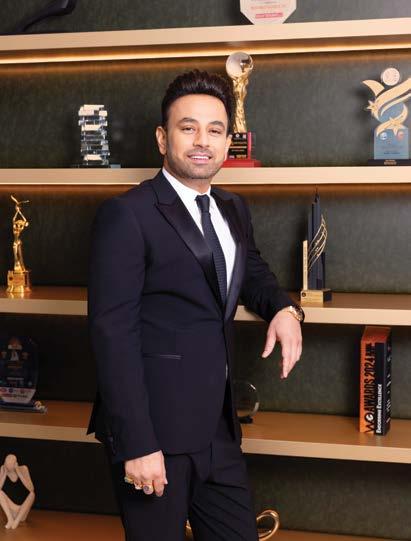
The apartments and townhouses are being brought to life by two internationally acclaimed design firms; The One Atelier, renowned for its work with leading global fashion houses on luxury branded residences such as Dolce & Gabbana, Fendi Casa and Karl Lagerfeld and ARQUINAUT, the creative studio acting as a consultant for ELLE Residences concept and the official ELLE representative.
Interiors draw on ELLE’s five pillars of fashion, beauty, culture, lifestyle and society to create spaces that feel curated and completely unique. Expect sculptural fireplaces, bespoke wallpapers, bronze accents and marble alongside soft, layered lighting and art that pays homage to the city’s vibrant and contemporary scene. ELLE Residences Dubai
Islands is designed as a wellness-driven community where rooftop pools and sunlit terraces capture panoramic Gulf view and curated spaces. From private spas and yoga decks to landscaped gardens and social lounges offering sanctuary and connection. A 24-hour concierge, valet and security ensure seamless service, while the amenities are tailored for balance, beauty and belonging.
Living at ELLE Residences Dubai Islands is about embracing a lifestyle as iconic as the brand itself. It’s a world where every detail is designed to inspire confidence, connection and joy. It’s an invitation to live your own cover story. The result is a collection of homes that feel as though they belong on the pages of a magazine.
17-20 NOVEMBER 2025
Riyadh Exhibition & Convention Centre (Malham), Saudi Arabia
MOST ATTENDED REAL ESTATE EVENT



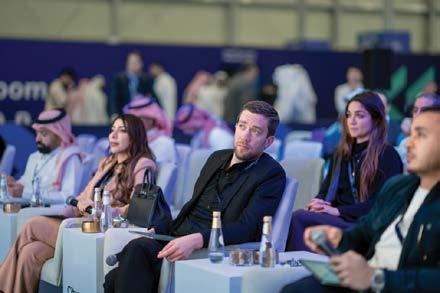
40 Countries Exhibiting
460+ Exhibitors
10 Country Pavilions
450+ Speakers
4 Stages


Gadgets and doodads that you might’ve missed out on, sourced by a tech aficionado. by
Watch out → /Apple Watch Series 11 B
Apple Watch Series 11 offers longer battery life, a more durable glass cover and 5G cellular capabilities, all in its thinnest and most comfortable design yet. With up to 24 hours of battery life and Ion-X glass that’s 2x more scratch-resistant, Apple Watch is more convenient than ever to wear throughout the day and night. Its powerful sensors capture data during sleep such as heart rate, wrist temperature, blood oxygen and respiratory rate - and, it can even possibly discover


TAMARA CLARKE


sleep apnea. With watchOS 26, Apple Watch can collate all of this data into a sleep score to help you understand and improve the quality of your sleep. With a cellular plan, you can take calls, send messages, and get help from emergency services, even when you’re away from your phone. Apple Watch Series 11 is available in 42mm and 46mm sizes in jet black, rose gold, silver, and new space gray aluminum cases, and also in polished titanium in natural, gold, and slate.

Oppo Find X9 Pro pushes boundaries even further with its breakthrough 200MP Hasselblad Telephoto camera, which delivers unparalleled detail and clarity in zoom shots. Beyond photography, Find X9 Pro delivers exceptional video capabilities, supporting recording at up to 4K 120fps in Dolby Vision. The device is powered by the MediaTek Dimensity 9500 chipset, paired with OPPO’s advanced third-generation silicon-carbon battery technology, with 7500mAh in capacity to deliver up to two days of battery life with average usage. Finally, to ensure seamless connectivity across ecosystems, O+ Connect now supports both Mac and Windows PCs, allowing you to manage phone files from your computer or remotely control your computer using your mobile phone. Screen Mirroring also lets you cast and control up to five apps from your phone on a PC, perfect for multitasking during meetings or lectures.
Galaxy XR allows you to enjoy deeply immersive AI experiences, both at work and at home. With Gemini integrated at the system level, Galaxy XR feels like a new type of AI companion that helps manage daily tasks through voice, vision and gesture. The headset understands your surroundings by seeing what you see and hearing what you hear, which allows Galaxy XR to respond in a conversational way that feels natural and human. Thanks to its advanced sensors, cameras, and powerful hardware, Galaxy XR can precisely track your head, hand and eye movement. Microphones are strategically placed and supported by software to filter out external noises and you can explore both virtual and real worlds in XR-specialized apps with assistance from Gemini. The headset also opens new levels of immersive entertainment such as viewing sports in a stadium and receiving coaching advice while playing AI enhanced games. The battery pack is separate from the headset, making the device more compact, light and comfortable to wear. Galaxy XR also features a detachable light shield to block external light when attached. These thoughtful innovations allow you to fully engage in Galaxy XR experiences with ease.
TAMARA CLARKE, a former software development professional, is the tech and lifestyle enthusiast behind The Global Gazette, one of the most active blogs in the Middle East. The Global Gazette has been welcomed and lauded by some of the most influential tech brands in the region. Clarke’s goal is to inform about technology and how it supports our lifestyles. Talk to her on Twitter @TAMARACLARKE theglobalgazette.com
From better goods to better wardrobe bests, every issue, we choose a few items that make the approved executive selection list. In this edition, our picks are from Jara by Martín Berasategui and UKLASH.

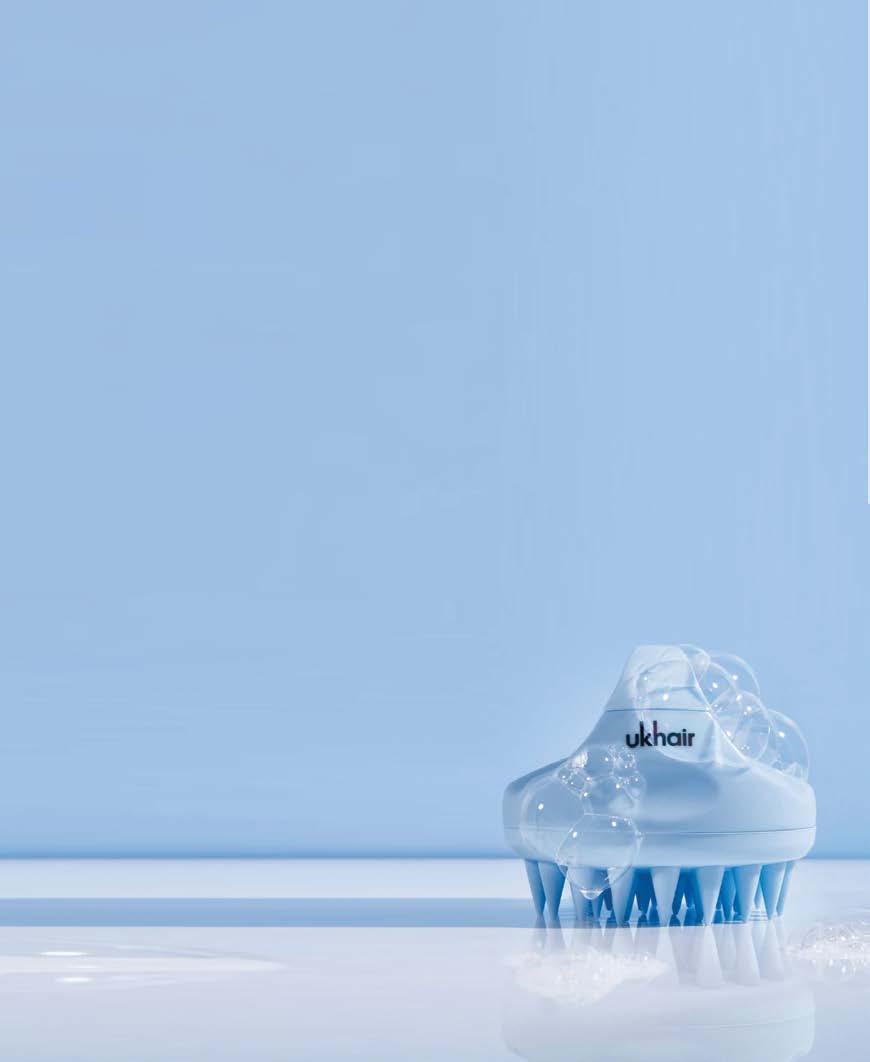
Founded in London in 2018, UKLASH set out to create effective, affordable products that enhance natural beauty. Originally known for its lash serum, the brand has since expanded into a full hair-care range and now ships worldwide, including to the UAE. It targets consumers seeking stronger, fuller hair through non-invasive, everyday beauty solutions.
I recently tried a few of UKLASH’s new hair products: the Hair Growth Serum, OMG Hair Vitamins, a scalp massager, and the Mini Hair Essentials travel set.
The Hair Growth Serum—made with pea sprout extract (AnaGain™) and other botanicals—felt light and non-greasy. After a few weeks, I can expect less shedding and more baby hairs, but only if I stay consistent. The OMG Hair Vitamins are vegan, glutenfree gummies packed with biotin, B vitamins, and zinc. They’re easy to take, but patience is required—results are said to appear after about three months.
The scalp massager turned out to be my favorite add-on—it makes applying the serum easier and genuinely feels relaxing. Overall, UKLASH’s hair line feels thoughtful and cleanly formulated. For those seeking a stylish, clean beauty brand focused on hair density and strength, UKLASH presents a credible option. www.uklash.com
by Martín Berasategui
There’s something quietly magnetic about Jara at The Lana, Dorchester Collection — the kind of place that makes you pause before the first bite even arrives. This season, the restaurant unveils its autumn-winter program, bringing the flavors and warmth of the Basque Country to Dubai through tapas-inspired evenings, oyster rituals, and special celebrations of Basque heritage.
The space glows with an amber light that turns dinner into theatre. The croquetas are impossibly smooth, the octopus perfectly charred, and the pintxos arrive as delicate compositions of texture and flavor. Every dish feels personal, crafted with the kind of precision that tells you someone cared.
With this new chapter, Jara continues to cement its place as one of Dubai’s most distinctive dining destinations — where European craftsmanship meets Middle Eastern sophistication in every course.
If you’re looking for a dining experience that blends artistry, warmth, and quiet sophistication, Jara is a must-visit this season. Go for the food — stay for the feeling it leaves behind.
The Lana, a Dorchester Collection Hotel Marasi Drive, Business Bay, Dubai, UAE www.dorchestercollection.com/dubai/the-lana


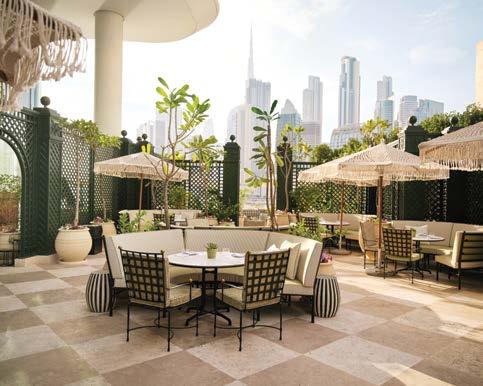


The MENA region’s leading venture capitalists share practical advice to help founders navigate the challenges of building and scaling a startup.
by TAMARA PUPIC
Co-founder and General Partner,
What are the top 3 things founders should absolutely do when preparing to raise their first round?
The first thing is clarity. Founders should be able to explain their problem and solution in a way that is clear and understandable to anyone. Too often, we see decks centered around a premise of "this can be a one-stop-shop, all things for all people." When you distill it down, it's not clear what specific problem(s) they intend to solve initially. Hopefully these businesses will become end-all, be-all platforms. But if you can communicate your initial value proposition and business model simply and powerfully, that's a huge advantage. The second is some form of traction. At the early stage, this doesn't always mean revenue, but there should be signs that people want what you're building—maybe it's user growth, pilots with big partners, or a strong community forming around the product. That signal shows you're building something real, not just theoretical.
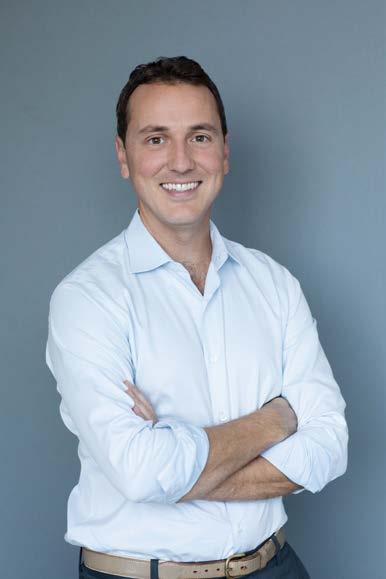

And the third is being prepared. This means very on top of your own numbers (particularly on how you spend, and how that spend converts to revenue). It means being clear and direct about what you're asking forinvestors get uncomfortable when a founder is vague about the amount they're raising or how they'll use it. It also means having a good understanding of what the investor on the other side of the table cares about. Investors very rarely are making isolated decisions about whether or not they like companies. They are solving for their own sets of objectives or constraints. Try to get an understanding of what those are.
} We are of course excited about the intersection of AI with both fintech and climate,including energy. And we're particularly excited about applications in emerging markets. There's a huge infrastructure and sophistication gap in financial services, and we believe AI will usher in a significant "leap-frogging" of solutions that have been developed over the past 10 years. We're also excited about how this new productivity paradigm will be applied to cross-border commerce. This is particularly important in our region, and the tighter the global trade restrictions become, the greater the opportunities for the private sector to serve as the bridges and connectors.
Investment Principal, BECO CAPITAL
becocapital.com
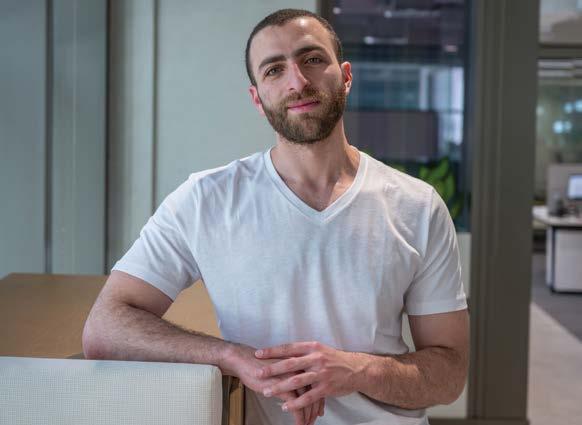

From your experience, what are the top three priorities for a founder getting ready to raise their first round?
Build a compelling, evidence-based narrative around timing and outcomes. A founder needs to articulate precisely why they're raising now (not six months ago or six months from now), exactly how much they need, and what specific milestones they'll hit within 18-24 months. This isn't only about growth projections; we also want to see that founders understand their business mechanics and have deep reasoning behind their plans.
Develop genuine capital discipline and efficiency metrics. Before founders access investor capital, they need to show they have a firm grasp of their financial dynamics. This means understanding unit economics at a granular
level, modelling burn rates across various scenarios, and identifying the key drivers that impact their business, both within and beyond their control. Most importantly, they need to prove they can achieve significant progress with limited resources. The strongest founders view capital as an accelerant, not a substitute for resourcefulness. This disciplined approach prevents the trap of building quick fixes rather than sustainable solutions, ultimately creating businesses that can weather market volatility and thrive across economic cycles.
Master the art of confident vulnerability. Founders should be absolutely clear about their unique advantages and what they understand about their market that others don't. But equally important, own mistakes and knowledge gaps completely. The startup journey is long and
} Personally, I'm most excited about logistics right now because of the perfect storm of factors aligning in our region. There are macro shifts happening globally with supply chains restructuring, and our positioning in the Middle East puts us at the centre of emerging trade routes. What makes this particularly compelling is our leapfrog advantage. Unlike markets with legacy infrastructure that create switching costs and complexity, we can build modern logistics networks from scratch. We don't have the burden of outdated systems that other regions need to work around. The sector is ripe for disruption across multiple layers. On the software side, there are massive opportunities in AI-powered optimization and automation. On the hardware side, we're seeing robotics and autonomous systems becoming commercially viable. The combination creates this rare situation where you can disrupt the entire stack simultaneously.
At BECO, we've developed a specific thesis around logistics and are actively seeking founders who understand both the regional opportunity and the technology convergence currently underway. It's one of those sectors where timing, geography, and technology are all aligned.
not always up and to the right, investors know this. We get excited by founders who demonstrate clarity on why and what they're building, are open about failures and learn quickly, and have the intellectual
honesty to pivot when necessary. This combination of conviction and humility signals they're coachable and won't waste time or money defending ideas that don't pan out as expected.
Chairman
jabbar.com

Please name three nonnegotiables for founders preparing for their first fundraise.
First, get clarity on your story—investors want to know why you and why now. That means a sharp narrative that explains the problem you're solving, your differentiation, and why this is the right moment in the market.
Second, understand your numbers. Too often I see early founders pitch a vision but struggle to explain basic unit economics, market size, or go-to-market strategy. Even at the seed stage, having a realistic view of financials and growth drivers builds credibility.
Third, assemble the right team. Investors back people, and they want to know you're not building this alone. Even at the earliest stage, having a small but capable team, especially a strong cofounder is essential. A good founding team with complementary skills often matters more than the idea itself.

} Everybody is talking about AI. I'm also closely watching AI-driven applications. For me, it's less about building the next foundational model and more about practical AI that transforms industries—whether it's healthcare, education, or commerce.
I'm also excited about fintech and financial inclusion, especially in emerging markets. There's still a massive gap in access to credit, savings, and transparent financial products, and technology is bridging that gap. We have great Fintech companies in our portfolio such as Ziina that is doing just that. Finally, I'm passionate about social impact ventures. With Tadamon, the non-profit app I co-founded in Jordan, I've seen firsthand how digital platforms can mobilize communities and resources. I believe the next wave of great startups will not just be profitable, but also purposeful.
Vice
President
VENTURE CAPITAL, MERAK CAPITAL merak.capital
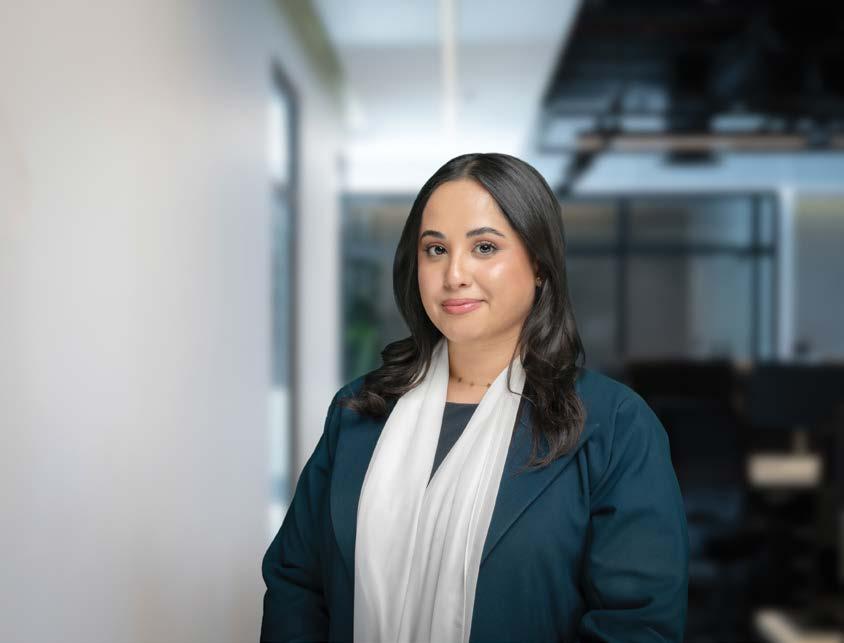
What three things can make or break a founder’s first fundraising round?
First thing would be (as cliché as it sounds) to have your 30 second pitch ready in plain language. It needs to be so clear and memorable that I can repeat it to someone outside your industry. And always bring it back to market size and inevitability: why this matters, why now, and why it could be big. Your deck should also reflect that in a clean, basic format: problem, solution, market, traction, forecast, how much you're raising, what you'll use it for, and why your team is the one to back.
Second, I would suggest keeping your cap table simple. Investors want to see a straightforward ownership structure. It's always better to have fewer, more aligned partners on your cap table than a long list of people. And lastly, I would say to show that you're operating with what's current. Every founder today says "we're using AI" so if you are doing that, then own it and be specific about how you're integrating new tech to be more efficient and capital-smart. Whether you think we're in a bubble or in the middle of a real transformation, have a stance, because investors want founders who are keeping up with what's happening in 2025.

} What's genuinely exciting to me is the idea that the tools we use every day don't have to be boring. For so long, the apps we used for learning, health, or managing our tasks felt like a burden and I'm fascinated by how ideas from gaming and media are changing that. Rather than just making people more "productive", it's about using the principles of play and community to make achieving personal goals genuinely engaging. Plus, I just love the concept that we can use technology to bring more joy and engagement into the necessary parts of life.
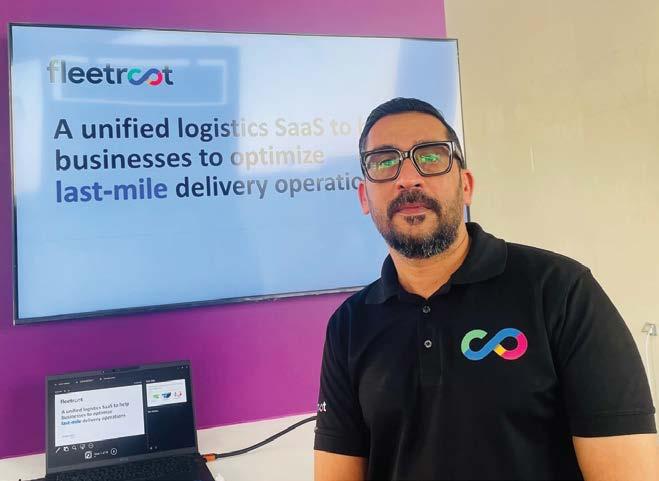
With a strong foundation in the transportation industry, Moidu Chandanam, founder of logistics platform Fleetroot, gained firsthand insight into the operational challenges businesses encounter in managing their logistics efficiently. However, his decision to tackle these challenges went beyond simply launching a business—it was driven by a desire to create lasting impact and build something meaningful. “The big gap I saw was in how last-mile logistics and mobility were managed,” Chandanam says. “Businesses were relying on manual and outdated systems, and customers expected fast, seamless service post-COVID-19. That mismatch created inefficiencies and frustrations. I realized there was a huge opportunity to build technology locally that could solve these gaps, while also being scalable across the region.”
Since launching in the UAE in 2018, Chandanam’s startup has grown into a software-as-aservice (SaaS) platform that helps businesses in optimizing the last-mile delivery of goods and services, predominantly in healthcare, retail, and logistics. Following the support from Egyptbased Flat6Labs and the UAE’s Mohammed Bin Rashid Innovation Fund (MBRIF) accelerator program, Fleetroot is now a part of TASMU Accelerator by Qatar’s Ministry of Communications and Information Technology (MCIT). “Right now, we’re focusing on strengthening our footprint in Qatar and expanding into other GCC markets, while continuing to build our product,” Chandanam says. “The support in Qatar has been encouraging. Accelerators and programs like TASMU Accelerator have given startups like ours access to mentorship, networking, and exposure that would have been difficult to achieve on our own. The regulators are also showing flexibility, which is
important for innovation. Of course, there’s room for the ecosystem to grow further, but the direction is very positive.”
For Fleetroot, Chandanam continues, Qatar has proved to be a strong launchpad. “The domestic market is smaller, yes, but it allows us to test, learn, and refine our solutions quickly,” he says. “From there, we’re already looking outward especially to GCC neighbors where similar problems exist. The key is to build something solid at home and then replicate it across markets where the need is just as strong.”
Speaking of startup challenges, Chandanam points out to building trust and raising capital. “As a startup, you don’t always have the brand or resources of larger companies, so you have to prove yourself with every customer,” he says. “I overcame it by being very hands-on with clients, listening closely to their needs, and making sure we delivered on our promises. Over time, that consistency built credibility.”
Chandanam adds, “Raising capital is never easy, anywhere in the world. In Qatar, the conversations are definitely opening up more than before. Local investors are becoming more curious about early-stage startups and the kind of value they can create beyond just financial returns. That said, I think we’re still in the early days but the shift is happening, and it’s promising.”
Fleetroot’s mission to revolutionize last-mile delivery through advanced technology and customized solutions—viewed as essential to any company’s success—aligns seamlessly with the Qatar National Vision 2030. Chandanam adds, “Qatar National Vision 2030 is about building a knowledge-based economy, and that directly aligns with what we’re trying to do using technology to improve efficiency and sustainability. Having that
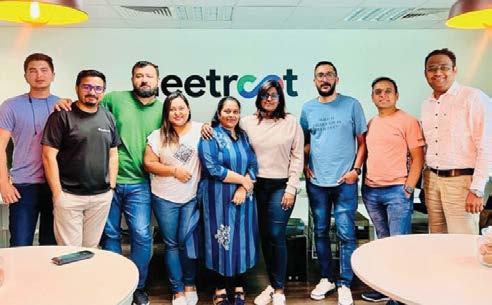
“
THE SUPPORT IN QATAR HAS BEEN ENCOURAGING. ACCELERATORS AND PROGRAMS LIKE TASMU ACCELERATOR HAVE GIVEN STARTUPS LIKE OURS ACCESS TO MENTORSHIP, NETWORKING, AND EXPOSURE THAT WOULD HAVE BEEN DIFFICULT TO ACHIEVE ON OUR OWN.”
alignment gives us confidence that our work is contributing to a bigger national goal, not just our own company’s growth.”
As a closing thought, he advises aspiring entrepreneurs in Qatar to align their ventures with the nation’s long-term vision while focusing on solving real, on-theground challenges. “Start small, but start. Don’t wait for the perfect
moment or the perfect product. Entrepreneurship is a journey of constant learning and adapting,” Chandanam concludes. “Also, be patient, success doesn’t happen overnight, but if you stay close to your customers and keep solving their problems, growth will follow. Most importantly, remember why you started your ‘why’ will keep you going through the tough times.”
Adel Haddad, co-founder and Chief Strategy Officer at Aumet, an artificial intelligence (AI)-first procurement operating system for healthcare, on how his journey reflects the promise of Qatar’s evolving startup ecosystem.
by TAMARA PUPIC
Before co-founding Aumet, an artificial intelligence (AI)-first procurement operating system for healthcare, Adel Haddad worked in finance, corporate and investment banking, which offered valuable structure and discipline but also highlighted the limits of large organizations. To broaden his perspective, he pursued an MBA at IE Business School, where he deepened his interest in entrepreneurship and innovation. However, it was his Aumet co-founder, Yahya Aqel, who ultimately ignited his entrepreneurial spark. “While working in pharmaceutical supply chains, Yahya experienced first-hand how manual and wasteful procurement cycles were, and how fragile healthcare supply chains became during COVID-19. For me, it was the convergence of seeking a faster-paced environment and tackling a meaningful inefficiency. Together we decided to build Aumet to address those pain points in healthcare procurement.”
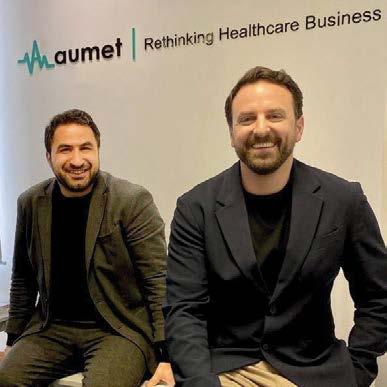
As an AI-enabled business-to-business (B2B) healthcare platform that provides tailored solutions to healthcare providers, Aumet sprang to life in the US, Saudi Arabia, and is now a part of TASMU Accelerator by Qatar’s Ministry of Communications and Information Technology (MCIT). “Healthcare providers—hospitals, clinics, pharmacies— struggled with two interrelated issues: access and waste. On one side, securing the right medicines on time was difficult due to fragmented procurement and supply chain silos. On the other, huge quantities of medicine expired unused because of short shelf life and poor forecasting,” Haddad explains. “In Qatar, as in the wider region, providers lacked digital infrastructure for
inventory forecasting, redistribution, or real-time data-driven procurement. That gap is what Aumet set out to solve: building a platform that minimizes waste, ensures consistent supply, and reduces inefficiencies across the healthcare value chain.” Aumet now operates in Saudi Arabia, the Gulf Cooperation Council, Jordan, Egypt, and France. “We are at a pivotal moment, closing our Series A round. This will allow us to expand in Qatar by hiring a dedicated business development team and tapping into the strong data science talent pool from local universities,” Haddad says.
Beyond fundraising, Haddad adds, Aumet has already proven the impact of its solution at scale. “In Jordan, we successfully digitized the procurement and inventory cycle for the
Ministry of Health’s hospitals,” he says. “At Al-Bashir Hospital, the largest in the country, our system reduced medication waste significantly—translating into over JOD2.3 million in savings in just one year. That success has validated both our technology and our model, giving us a strong case study to replicate in Qatar and beyond.”
Having raised pre-seed, seed stages, and pre-Series A round, the Aumet team is now encouraged that Qatar Development Bank (QDB), one of Qatar’s sovereign entities, has come on board as a strategic backer in its current Series A round. “It is helping us bring our solution into the public hospital system. This type of institutional support not only provides capital but also credibility and access to major stakeholders,” Haddad says. “We’re also seeing a shift among other investors in Qatar. While early-stage risk appetite is still developing, accelerators like TASMU Accelerator | MCIT have bridged that gap by validating startups, connecting them with corporates, and providing structured pathways for engagement. This is creating more confidence for investors to consider backing earlystage companies.”
In developing the Aumet platform, Haddad found it challenging to balance the fast-paced nature of a startup with the slower, more structured processes of larger institutions. “Public procurement processes and regulatory frameworks often take time, which can feel slow for an agile company like
ours,” he says. “We’ve learned to adapt by starting with smaller pilots that demonstrate value quickly. Once stakeholders see
says. “Regulators have also shown increasing openness to digital health solutions, particularly those that align with
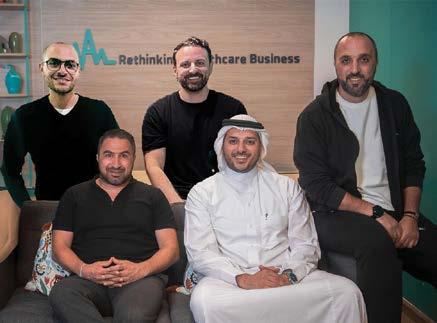
tangible results, it’s easier to build trust and scale. We also invest heavily in relationshipbuilding with regulators, hospital administrators, and partners early on, so that when the time comes to expand, we’re already aligned.”
As Qatar positions itself as a regional hub for innovation, the country’s expanding ecosystem of investors, regulators, and accelerators has become a key enabler for emerging entrepreneurs.
Within this dynamic environment, Haddad explains how the local support network has shaped and accelerated his journey.
“The support ecosystem has been instrumental. TASMU Accelerator, for example, gave us direct exposure to policymakers and healthcare providers that would have been hard to reach alone,” he
national priorities. These combined efforts create an environment where startups can genuinely plug into the ecosystem rather than operate on the fringes.”
As Qatar positions itself as a regional hub for innovation, especially trough its Qatar National Vision 2030 and National Health Strategy 20242030, the country’s expanding ecosystem of investors, regulators, and accelerators has become a key enabler for emerging entrepreneurs. Within this dynamic environment, Haddad reflects on how the local support network has shaped and accelerated his journey.
“Qatar prioritizes system efficiency, resilience, and service quality—goals that align directly with our
mission,” he says. “For us, that alignment means our projects have strategic relevance: when we present a solution that improves efficiency in procurement and reduces waste, we are not just solving a hospital’s operational problem—we are contributing to national objectives. That perspective shapes how we pitch, where we allocate resources, and how we design our partnerships.”
As many founders look beyond Qatar for growth, Haddad remains focused on building a strong foundation from Doha while strategically exploring regional and global opportunities.
“Qatar offers a strong foundation: reliable infrastructure, high standards of living, and visa policies that make it easier to attract international talent. That makes Doha a viable base for scaling,” he says. “At the same time, our growth strategy is regional and global. We are using our success cases—like the Jordan MOH transformation—as proof points for neighboring markets in the GCC and MENA. We are exploring partnerships with regulators, large hospital groups, and distributors in Saudi Arabia, the UAE, and Egypt.”
Haddad concludes, “In short, Qatar is our launchpad, but our ambition is to replicate successful deployments wherever healthcare procurement challenges exist.
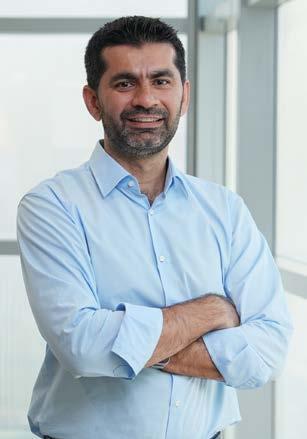
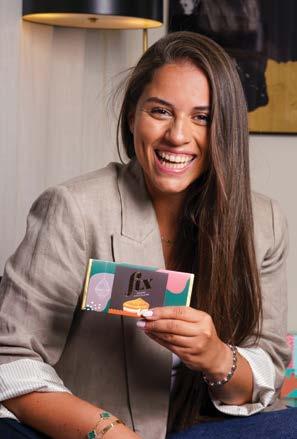
International Airport Terminal 3 — making this collaboration a rare opportunity for fans to get their FIX conveniently.
As part of the launch, Careem Plus subscribers will enjoy free delivery, with limited daily drops at 2pm and 5pm. Each handcrafted dessert bar starts from AED 68.25.
FIX’s Dubai Chocolate has become famous for sparking frantic runs and back-to-back sellouts whenever it’s released. At the World Economic Forum in Davos, attendees reportedly queued outside FIX’s pop-ups in the freezing Swiss air to buy its signature Dubai Chocolate bars. This partnership brings together two UAE-born success stories, each celebrated for their innovation and quality — and marks another step in showcasing Dubai’s ability to blend local creativity with digital convenience.
From October 20, 2025, Careem has become the only destination for the original Dubai Chocolate — as two iconic homegrown brands join forces to redefine indulgence and convenience.
FIX Dessert Chocolatier, creator of The Original Dubai Chocolate, has announced an exclusive partnership with Careem, the Dubai-based super app.
Starting October 20, 2025, Careem will be the only platform where customers can order FIX’s chocolate bars — delivered through Careem Quik in as little as 20 minutes across Dubai and Abu Dhabi.
Speaking exclusively to Entrepreneur Middle East, Mudassir Sheikha, co-founder and CEO, Careem, said, “In just three years, we’ve built Careem Quik into a service that delivers almost anything customers need - from
everyday essentials and groceries to electronics, and now premium desserts - faster than ever. Our partnership with FIX brings together two homegrown brands that have become part of daily life in the UAE, making something that once felt a little out of reach incredibly easy to get. FIX’s iconic Dubai Chocolate is a true reflection of local creativity and ambition, and we’re proud to help bring it to even more people across the country.
Known for its elusive presence, FIX operates with no physical retail store, website, or authorized reseller beyond its celebrated pop-up at Dubai
Yezen Alani, co-founder of FIX Dessert Chocolatier, said, “As we continue to grow, our customers will remain at the heart of everything we do and every decision we make. As a homegrown brand, choosing the right partner is really important to us – and we’re thrilled to begin this new chapter hand in hand with Careem.”
Bassel Alnahlaoui, Chief Business Officer at Careem, added, “This partnership brings together two brands that have become part of everyday life in the UAE. By bringing FIX’s iconic bars to Careem, customers in Dubai and Abu Dhabi can enjoy a true local favourite delivered straight to their doorstep. From rides and meals to groceries and now premium desserts, our goal has always been to deliver what customers want, when they want it: seamlessly and all in one place through Careem.”





